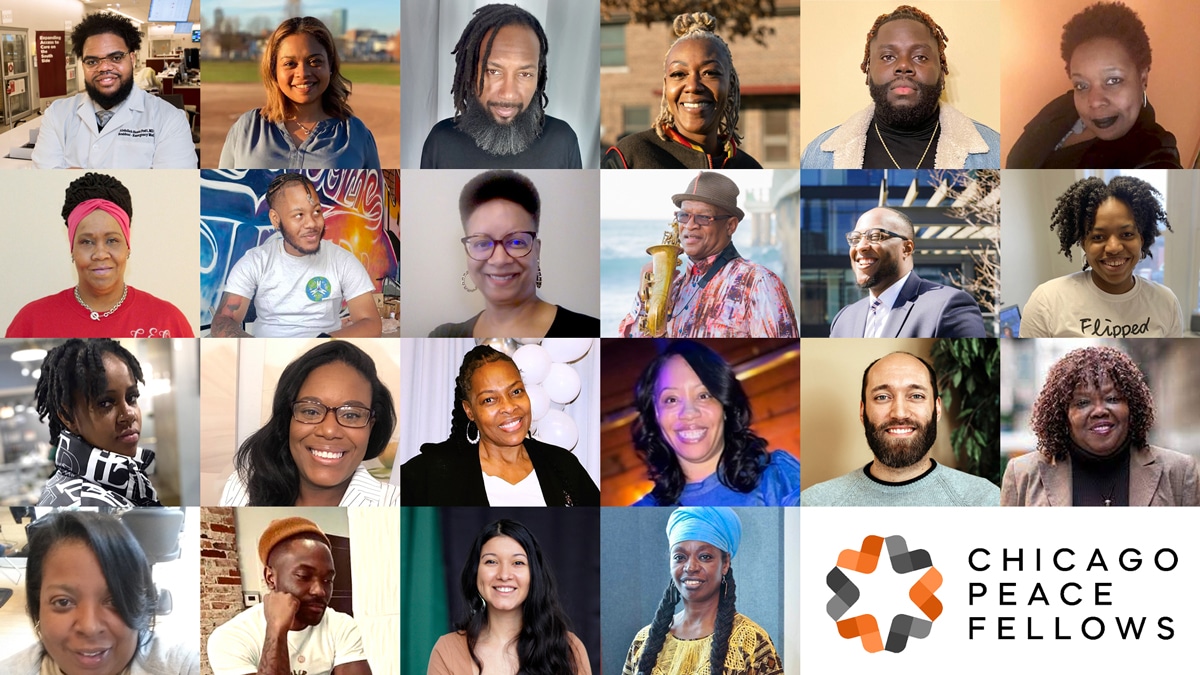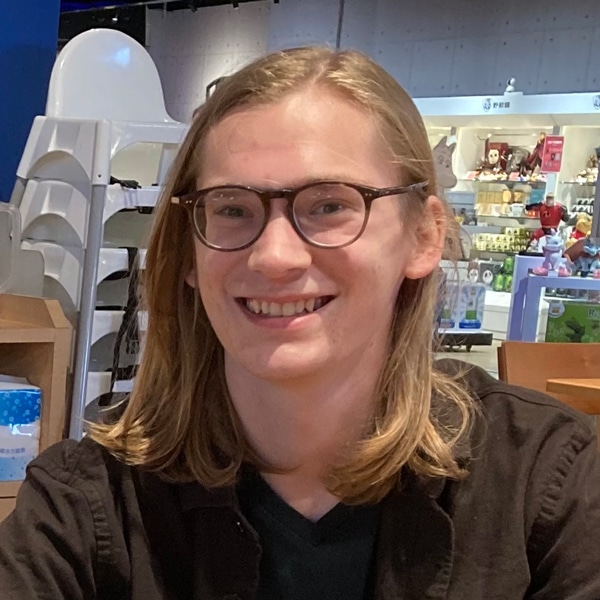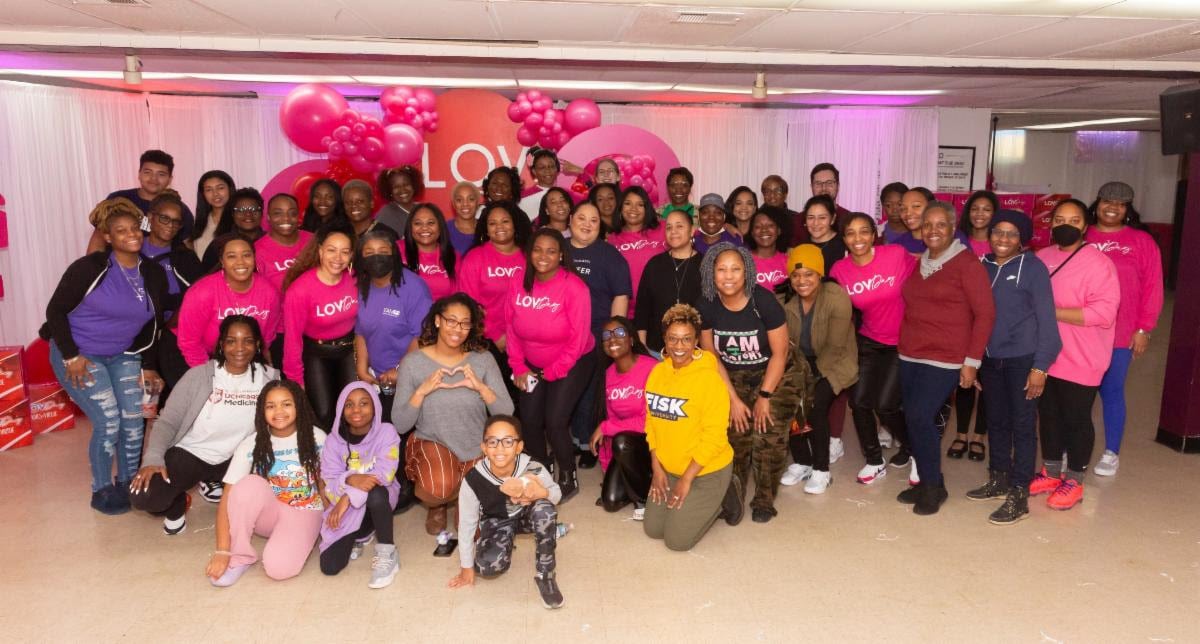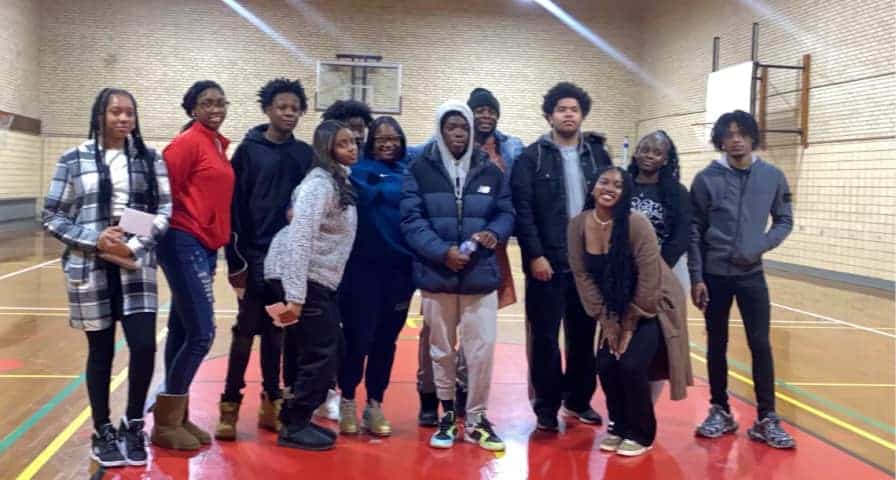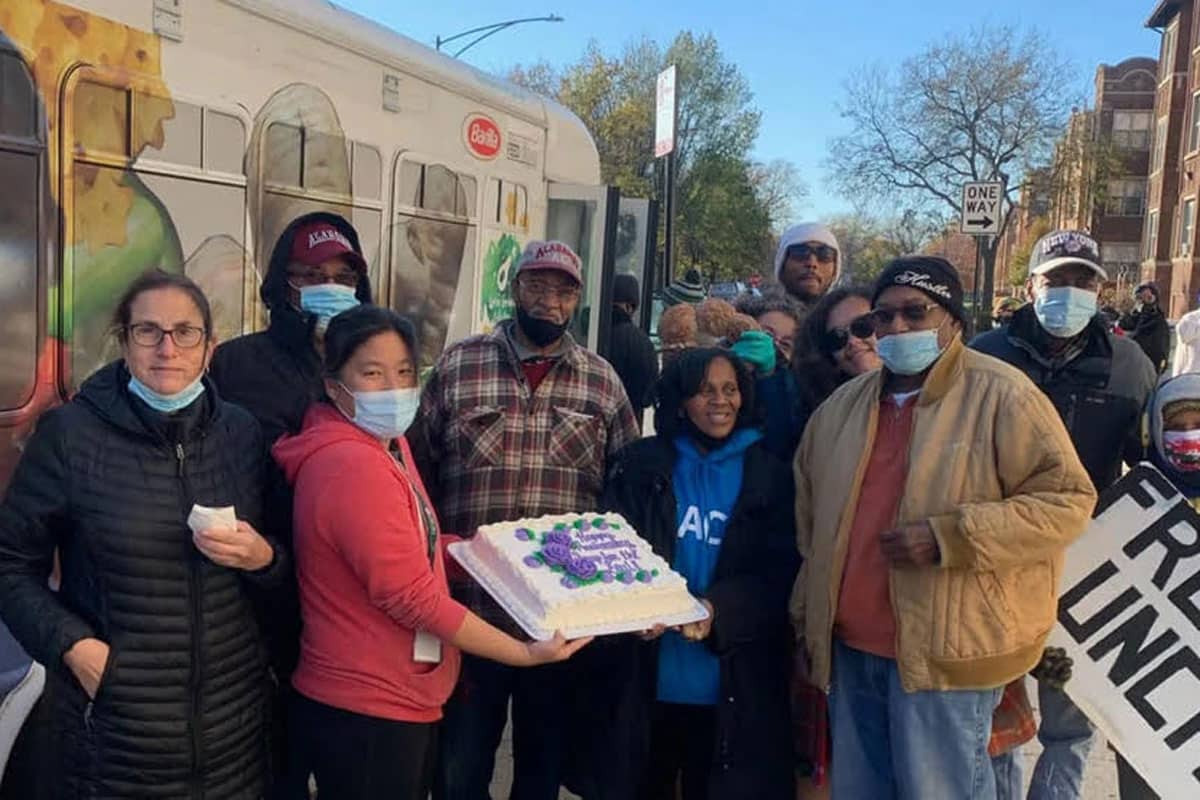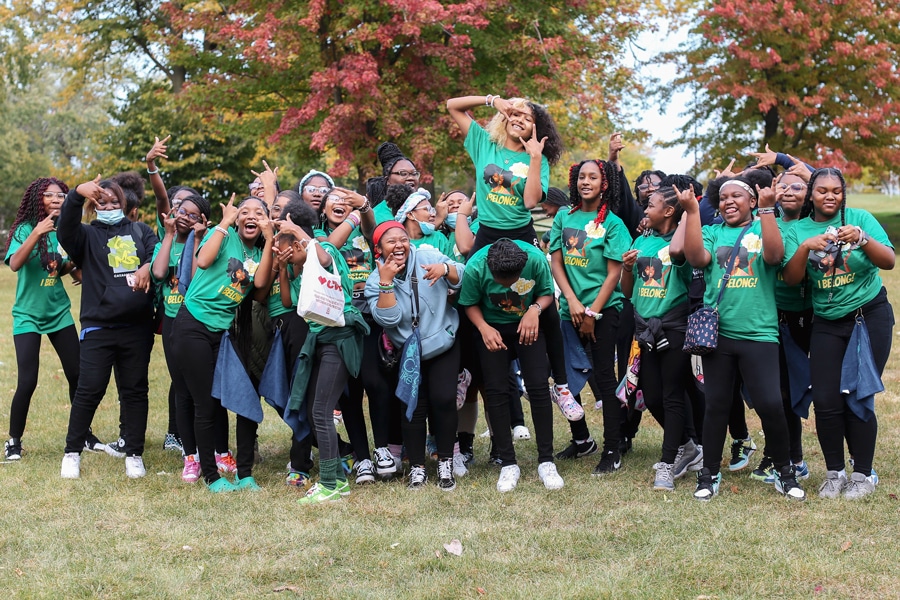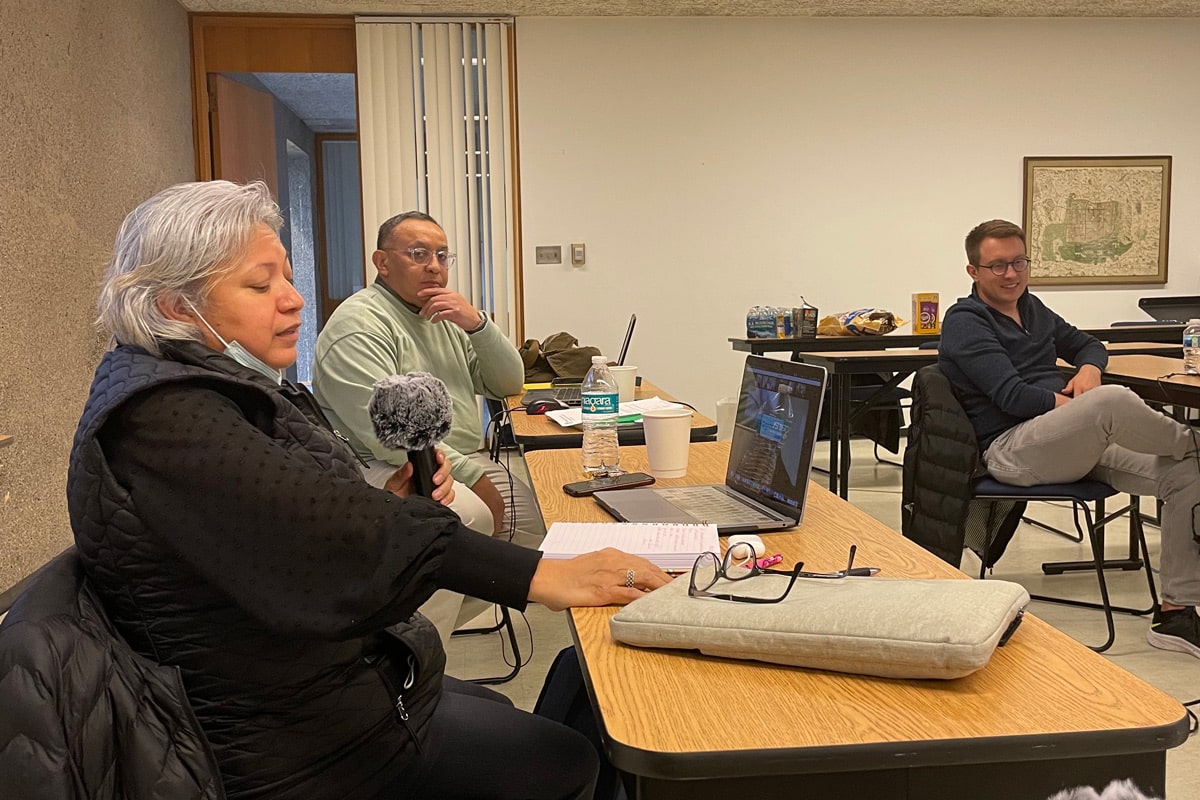Meet the 2023 Chicago Peace Fellows
by Travis Rejman, Executive Director
The Goldin Institute invites you to learn about each of our 2023 Chicago Peace Fellows representing 14 community areas across the city. Founded in 2019 in collaboration with the Partnership for Safe and Peaceful Communities, the Chicago Peace Fellows program is the only leadership development program that is built by and for grassroots community leaders on the South and West sides of Chicago.

ABOUT GATHER
Peace Fellows participate in GATHER, an online asset-based community engagement course, as well as in-person training, collaborative action projects, and networking experiences with civic leaders, academic researchers, and policy makers. The Chicago Peace Fellows reduce violence by building relationships, engaging youth, collaborative peace building projects over the summer and by creating new networks among residents, families, schools, and nonprofit organizations.
The Fellows are learning together through GATHER, which is both a mobile platform for shared learning and a curriculum for people who want to build on the talents of their neighbors and the assets of their communities to make real and lasting change. Gather Fellows learn and work together through an innovative curriculum that comes pre-loaded on a tablet device with all the connectivity, materials, videos, practices and tools necessary to provide a mobile classroom and toolkit for community leadership.
The Chicago Peace Fellows project connects and equips cohorts of past grantees of the Chicago Fund for Safe and Peaceful Communities to reduce violence and promote peace. The 2023 Chicago Peace Fellows is the fifth all-Chicago cohort to utilize the GATHER platform, an online learning hub built by the Goldin Institute to empower grassroots leaders.
The Chicago Peace Fellows will engage in a 22-week course of intensive shared learning as well as group projects, culminating in a graduation event in September 2022. The curriculum has been designed in collaboration with the grantees themselves, based on their practical knowledge and hard earned wisdom, with input from a wide range of civic leaders. Fellows will reflect on their past summer work, identify successes and lessons learned, and improve their abilities by sharing strengths and learning new skills.
The Goldin Institute and the Partnership for Safe and Peaceful Communities have aligned missions that value authentic community leadership. The Chicago Fund is uniquely effective at finding motivated problem-solvers and community-builders. By connecting Chicago leaders through GATHER, their efforts to nurture safer and more peaceful communities will be more effective, interconnected and lasting.
OUR PARTNERS
A special thanks to the Chicago Community Trust, the Conant Family Foundation, Crown Family Philanthropies, the Frankel Family Foundation, the MacArthur Foundation, the Polk Bros. Foundation, the Racial Justice Pooled Fund, the Seabury Family Foundation, and the Partnership for Safe and Peaceful Communities for making this program possible.
To follow along the learning journey with the Chicago Peace Fellows, please sign up for our newsletter and follow up on Twitter, Facebook and Instagram.
Black Star Project Showcases Careers in Sports at the NBA All-Star Weekend
By: Zeki Salah, Communications Associate
The Black Star Project recently partnered with BDM Sports & Education Project to send Chicago students to Salt Lake City to learn about careers in sports at the NBA All-Star Weekend from February 17-19. This trip marked the third year that the Black Star Project has sent young people to the NBA All-Star Weekend to provide them with an inside look at the professional world of basketball and with a fun weekend of basketball events.
Brian McCoy, or Coach Q, began the BDM Sports & Education Project in 2014 with the goal of making a positive difference on the South Side after repeatedly hearing about violence on the news. “What I know is that a young person can’t shoot a gun and a ball at the same time. So I went to one of the roughest spots in Chicago and said, ‘Hey, I want to do a free sports camp for young kids’ [...] I think the kids I spoke to felt my sincerity because I gave them a clipboard and when I returned later the clipboard was filled on both sides.” Coach Q then went to his contacts in community activism and education, including Gloria Smith, a 2020 Chicago Peace Fellow, and approached them about starting a youth sports camp, with a focus on the business side of sports. He held his first camp in Englewood in 2014 and has continued to hold basketball camps, baseball camps, and most recently an introduction to golf.
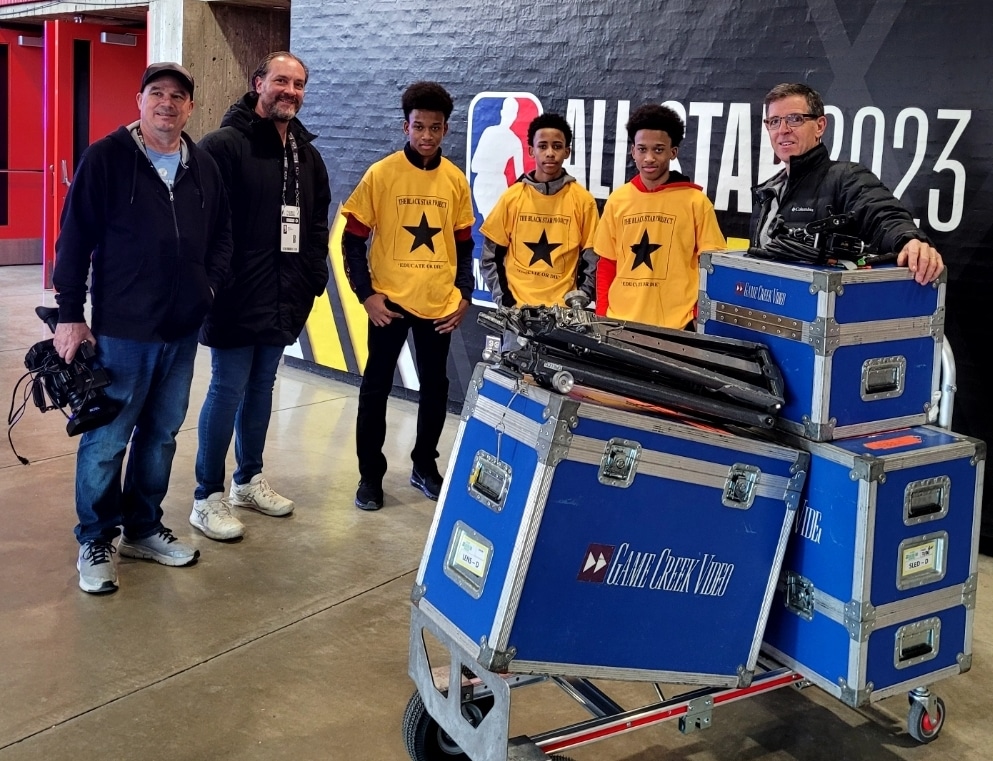
The trips to NBA All-Star Weekends have been held by Coach Q and the Black Star Project for the last three years. The trips aim to combine an introduction to the business of sports with a fun weekend for teens on the South Side. The trips place a focus on academics and include essay contests before and after the trip. In prior years, the Black Star project has chosen participants for the trips based on essays that they write on their interest in a career in sports. This year, an essay contest is being held for a cash prize following the trip. Coach Q and the Black Star Project also provide a ten week business of sports curriculum leading up to the trip, which allows the young people to learn about the different professions within the sports industry before they go on to meet them at events such as the All-Star Weekend. Speaking to the idea of synthesizing the business aspect and sports aspect of the trip, Coach Q said:
The average young person wants to be the next Lebron James, but in actuality, the probability is really slim [...] So, what I try to do is let them know that it’s okay to have dreams, but let them know the reality of the situation and ask: ‘What are you really looking for?’. By taking them to the game you can show them both sides, the excitement, but also the thousands of people making that game happen. There’s a camera man, a sports physician, a sports attorney, an agent, a sports statistician, a kinesiologist; there’s so many different careers involved that no one ever talks about.
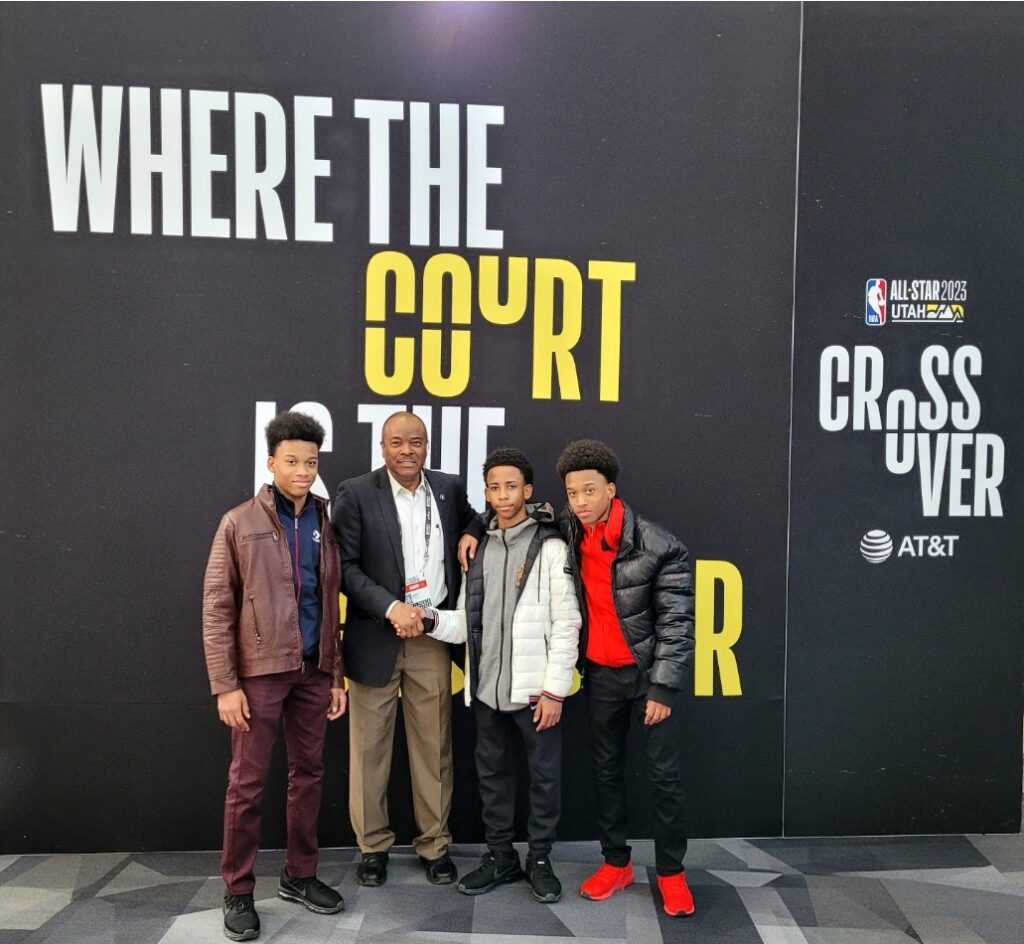
The Black Star Project took the lead on programming and fundraising for the All-Star weekend, while Coach Q accompanied the young people and introduced them to professionals in the sports business. The first event they attended was the HBCU Classic, an annual basketball game between two Historically Black Colleges and Universities (HBCUs) that was started by the NBA to show their commitment towards social justice in response to boycotts during the Black Lives Matter movement. The young people on the trip also participated in an HBCU college fair and learned about the NBA’s HBCU Fellowship program, which aims to provide career development opportunities in the business of basketball for undergraduate and graduate students from HBCUs. After the fair, the young people were also able to meet and greet with sports business professionals.
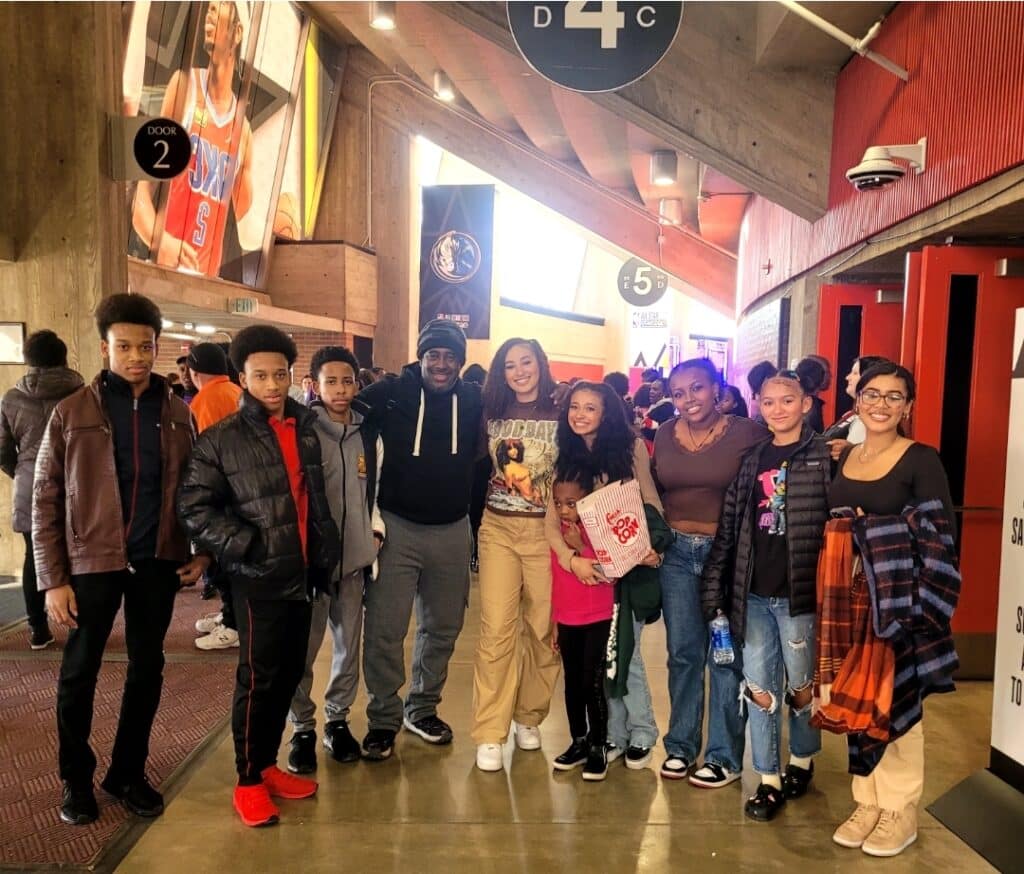
Throughout the weekend, programming combined both opportunities for the young people to have fun and enjoy basketball programming and an inside look into potential careers. The young people on the trip were able to have dinner with Rev. Jesse Jackson, who attended the University of Illinois on a football scholarship. He provided insight as to how entering the business of sports could allow an individual to transition to other careers, such as career as a minister and civil right leader. There was also a more leisurely section of the trip where the young people attended the NBA Crossover, which is a multi-day interactive fan event that brings basketball culture to the forefront, featuring player appearances, live performances, art, and music. Combining both business and pleasure helped the young people think about their futures in a fun and energetic setting and provided them with a one of a kind opportunity.
Coach Q and the Black Star project aim to continue to hold trips to NBA All-Star Weekends for young adults on the South Side. They hope to not only hold trips to the NBA All-Star games, but also to the WNBA All-Star games so that young women can get involved as well. The next WNBA All-Star game will be held in Las Vegas in July. You can support the Black Star Project and their efforts to send students to these games to learn about the business of sports here.
BDM Sports & Education Project's (Powered by the Black Star Project) 4th Annual Youth Business of Sports Essay Contest
Following the trip to Salt Lake City, BDM Sports and Education Project held an essay contest for high school students with the following prompt: "The average NBA playing career is about 5 years, how should players maximize their opportunities for personal growth and professional development, during their time playing in the league, while also preparing for when their NBA playing career comes to an end... Life Beyond the ball?"
Winners of the contest include:
1st Place Winner ($1,000): Brandon Williams-Orr, Providence St Mel HS
2nd Place Winner ($500): Aaron Williams-Orr, Providence St Mel HS
3rd Place Winners (Tied) ($250): Laylah Richmond, Bolingbrook HS and Antonio Scott, Little Black Pearl HS
LOV Day 2023 Instills Purpose, Passion, and Perseverance
By: Zeki Salah, Communications Associate
On Saturday, February 11th, 400 self-care boxes were distributed to 400 girls across the neighborhoods of Bronzeville, Englewood, North Lawndale, and Austin areas. The boxes were distributed by Ladies of Virtue as part of their 3rd annual celebration of LOV Day. LOV Day was sponsored by the Chicago Peace Fellows Mutual Aid Collaborative as a partnership between 2019 Chicago Peace Fellows, Jamila Trimuel, Executive Director of Ladies of Virtue, and Dawn Hodges, Executive Director of Imani Community Development Corporation. Ladies of Virtue is a Chicago-based non-profit founded by Jamila in 2011 with the goal of becoming the premier mentoring and leadership training organization for Black girls in the world. LOV Day was established in 2021 to further their mission “to instill purpose, passion, and perseverance in girls, ages 9 to 18, while preparing them for college, careers and to become change agents in their communities."
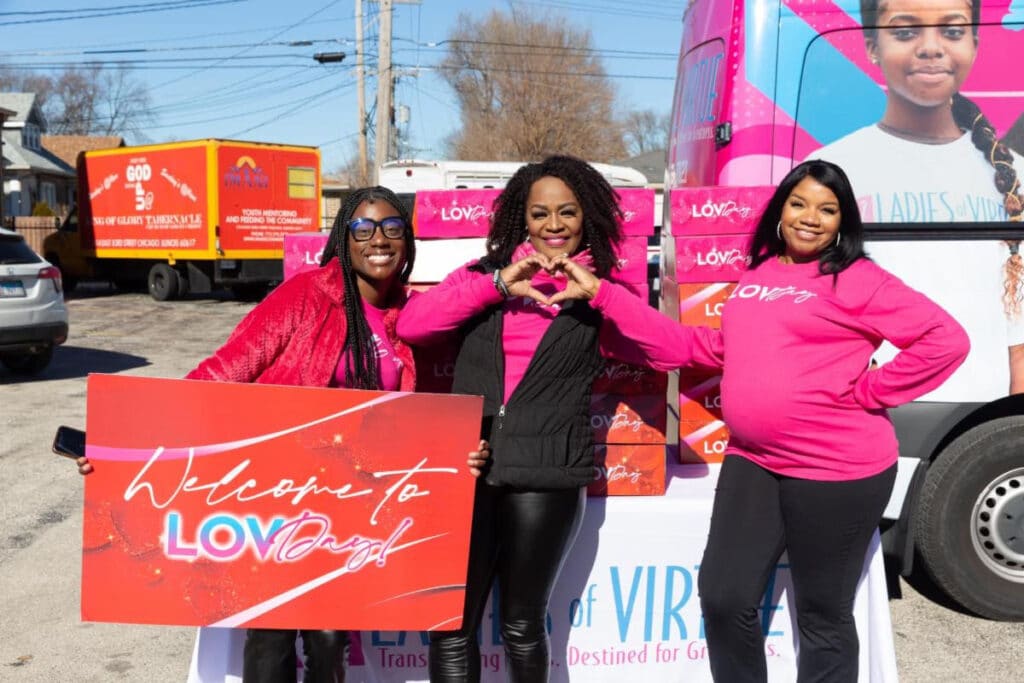
Ladies of Virtue is a mentoring and leadership program for girls, ages 9 to 18. Over the last 11 years they have served over 2,000 girls and families. LOV matches their participants with mentors and prepares them for leadership through our culturally relevant character building, career readiness and civic engagement curriculum. The team at Ladies of Virtue provides project management, collaboration and communication training via their two to four-month project experiences to empower girls to lead in the modern workforce. After graduating from high school, with successful completion of LOV’s leadership program, participants are mentored and supported for six additional years, from 18 to 24, as LOV 4 Life alumni.
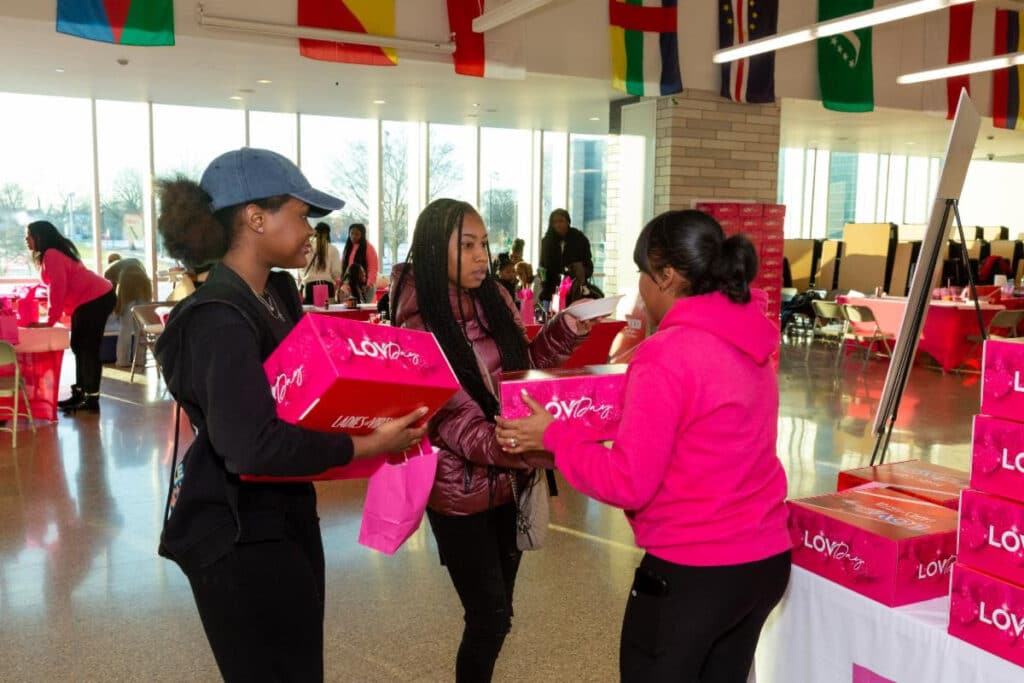
LOV Day was a community effort, obtaining funding from the Peace Fellows Mutual Aid Collaborative, drawing in fifty-five volunteers from 12 Corporate/Community Partners, and hosting events in six different schools and community centers. Jamila brought the proposal to fund LOV Day to the Mutual Aid Collaborative alongside 2019 Peace Fellow, Dawn Hodges.
The Mutual Aid Collaborative consists of 74 Black and Brown leaders and committed allies who live and work in the communities they serve on the South and West sides. They have raised over $100,000 to support several active projects. The Mutual Aid Collaborative met and collaboratively voted in January to provide LOV Day with funding to support the distribution of LOV Boxes filled with self-care items. Each LOV box included a teddy bear, chocolates and candy, a painting kit, hair care products, and Black history facts.
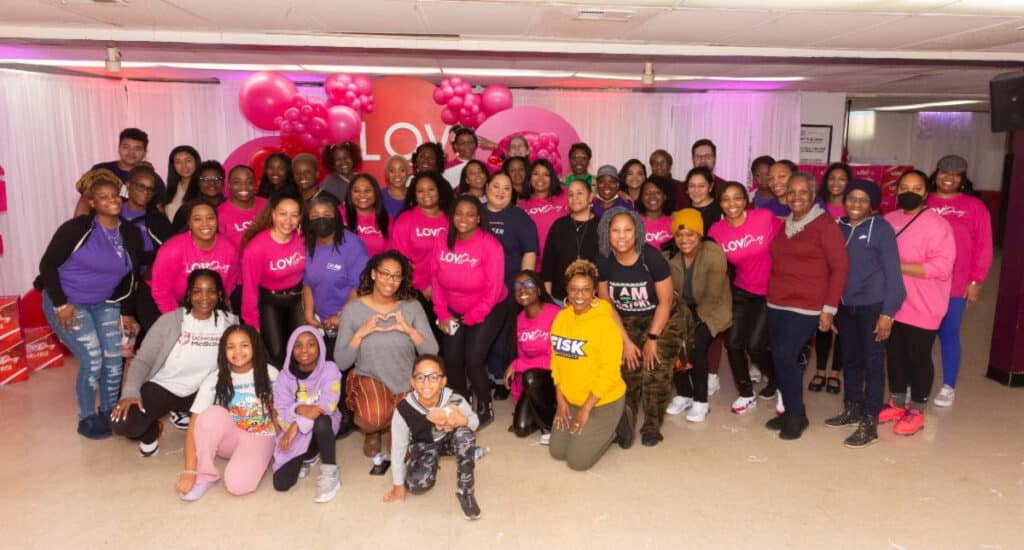
LOV Day served as a way to celebrate both Black History Month and Valentine's Day. Themes of Black history and culture were interwoven with the idea of providing girls with the space and opportunity to rest and care for themselves. LOV Day featured a self-care experience called “Black Girls Rest”. This event served 100 girls, twice as many as the previous year. Black Girls Rest included workshops on how to maintain healthy hair, skin care, and feminine care. Hair care stylists, cosmetologists, aestheticians, and an OBGYN all attended to provide guidance. Speaking to the themes of Black history and rest, one Lady of Virtue stated, ”All throughout Black history, slavery and during the Great Migration, Black people were constantly on the move and still to this day heavily dipped in GRIND culture. We need to STOP and REST.”
While 2022’s LOV Day centered more around the distribution of boxes, this year’s LOV Day focused heavily on programming, with Ladies of Virtue visiting six schools to hold self esteem and confidence workshops. Events include hair and makeup demonstrations, pillow decorating, mental health workshops, feminine and skin care tips, and candle making. The programs were conducted by program facilitators for the Ladies of Virtue and aimed to show Black Girls that they are and should be loved, nurtured, and protected. For instance, one workshop had girls identify what they love about themselves and encouraged their peers to support that expression of self-love.
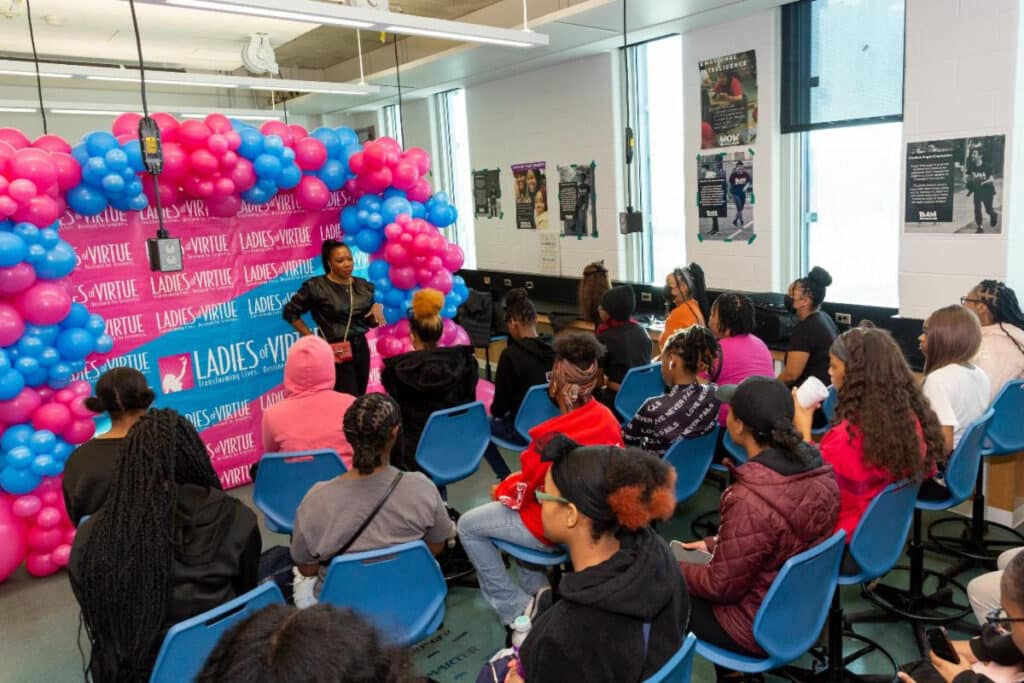
Jamila attended one of the LOV Day classes where girls were discussing when they were at their best. One girl that Jamila was working with said “Oh I love my smell because it reminds me of how my dad smells,” but then noted “ I really don’t talk about my dad much.” When Jamila asked why, the girl mentioned that he died a few weeks ago. Jamila reflected, “that really let me know that she felt like this was a safe space for her to express herself; that we were establishing a safe space for girls to just be themselves.”
To continue their mission of instilling purpose, passion, and perseverance in girls, ages 9 to 18, while preparing them for college, careers and to become change agents in their communities, Ladies of Virtues is always looking for volunteers. Volunteers serve as role models for their girls, parents, and the community. You can find volunteering opportunities for LOV at: https://www.lovchicago.org/volunteer
Generation Now 2.0: A Mutual Aid Collaborative Talk Show for Teens Produced by Teens
By: Michael Henderson, Director, Mutual Aid Collaborative
Generation NOW was conceived by Messiah Equiano, a 2021 Chicago Peace Fellow, and aims to provide opportunities for young people to work on a teen talk show that addresses everyday issues that teenagers face. The program pays teenagers to produce, direct, and act in the show and provides them with a safe environment to express their thoughts.
In August of 2022 Generation NOW filmed its first talk show that addressed “Dating and Violence”. Messiah Equiano, Executive Director of CHI-Rise, and Nicole Davis, Executive Director of the Talk to Me Foundation, saw first hand how therapeutic and empowering this platform was for teens. They deemed the first filming of Generation NOW as a success and proposed a second talk show to the Chicago Peace Fellows Mutual Aid Collaborative.
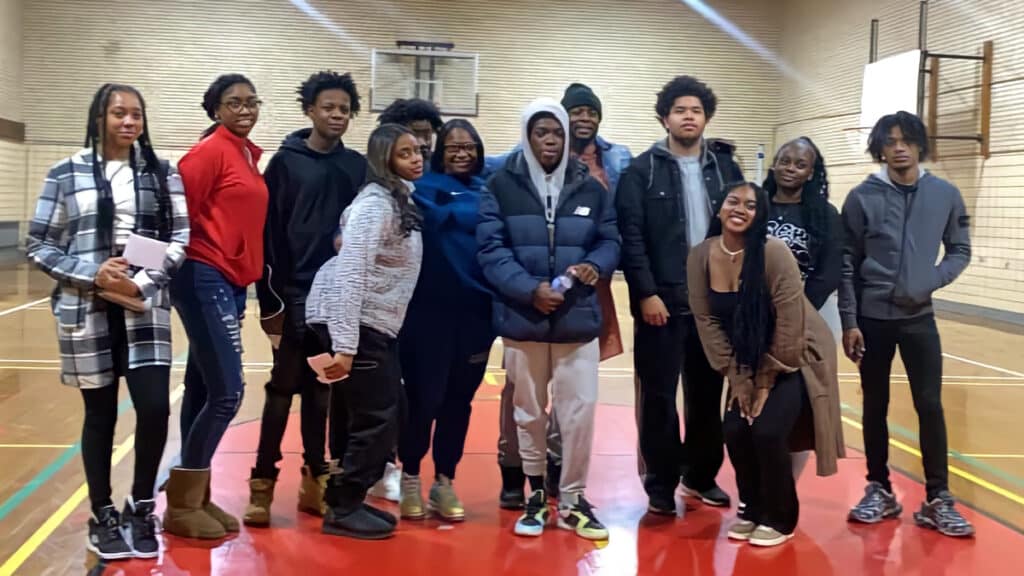
The Mutual Aid Collaborative consists of 74 Black and Brown leaders and committed allies who live and work in the communities they serve on the South and West sides. They have raised over $100,000 to support several active projects. The Mutual Aid Collaborative met and collaboratively voted to provide Generation NOW with the funding to film a second talk show at the Foster Park District.
Messiah and Nicole wanted to expand the dating conversation in the second filming and talk to teenagers about love. Nicole thought “Keeping with February as the month of Love and with so many young men and women at the ages of 12 and 13 dating, Generation NOW wanted to know what love looks like to them”. On Saturday, February 4, 2023 Generation NOW filmed a talk show focusing on young peoples’ understanding of love entitled “The Love Recording”.
Continuing the vision of the first talk show. Generation NOW provided young people with a safe setting to be open about their opinions, while also providing them with experience with different aspects of television production. Teens work on the project as writers, production members, or actors and were compensated for their work. Funds provided by the Mutual Aid Collaborative were used to pay ten teenagers $250 each for their involvement in a day of filming.
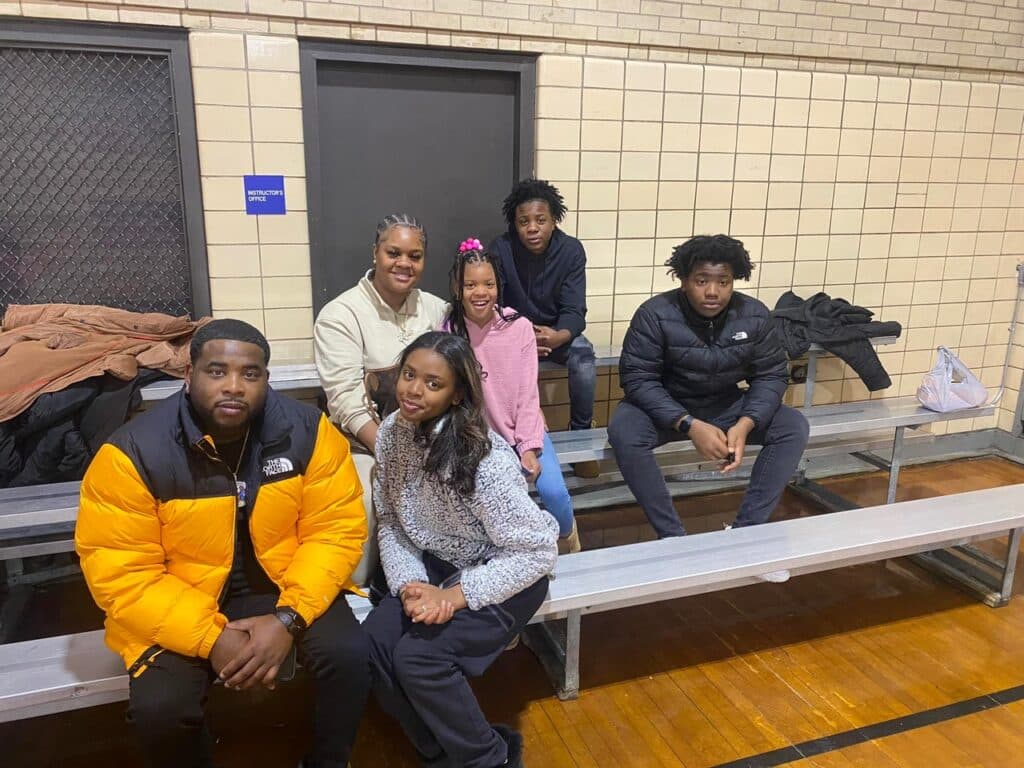
Messiah and Nicole agreed that teens are not always given the space to feel safe in the city of Chicago or in their homes and “it's ok to open up” and be vulnerable. The intimate and safe filming provided teens with a platform to voice their beliefs without judgment, but also with a chance to enact their visions in a production and to work together collaboratively. Each participating teen/young adult performed their expression of love through forms such as poems, monologues, and skits. Following the performances, discussions were held to explore the themes and messages of the show. The transparency and vulnerability of the answers according to the 25 plus attendees had the crowd “up in smoke”.
For one scenario performed at the “Love Recording,” young men and women were given flowers and candy to reenact how they will ask a person out for a date. The attendees were amazed at the vulnerability in the response and stories from the teens. The majority of the girls suggested that it's the responsibility of the guys to ask the girls out for a date, while some of the boys agreed that if a girl is asked out and has a boyfriend the girl should let the guy know. Another vulnerable teen shared his experience and story of being assaulted by a girlfriend. These stories allowed the teens to have open conversations about dating and the different kinds of expectations and responsibilities they feel in romantic life. The second filming was as successful as the first with both teens and parents participating with excitement.
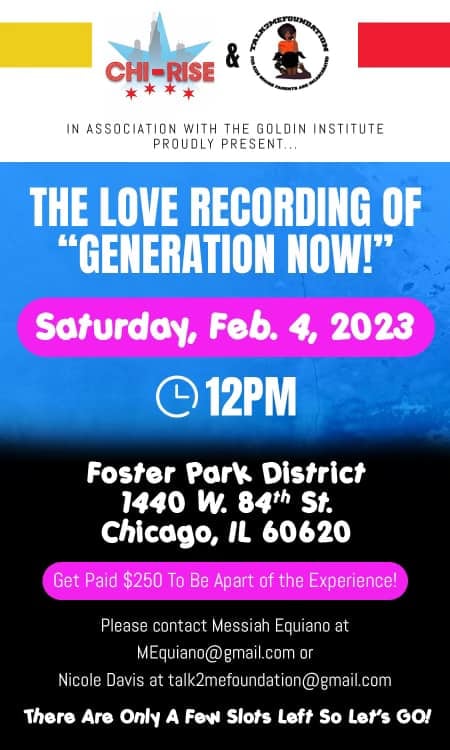
Generation NOW aims to provide teens with opportunities to express themselves. Messiah believes it's important to let teenagers know “they value their voices, they value their experiences, they value their input and their involvement in their communities”. CHI-Rise and the Talk to Me Foundation “want to give back” to their community and teens. They are looking to produce episodes of Generation NOW monthly. They are also looking towards expanding the programs to different communities, and looking specifically at communities with higher risks of violence and to get more parents involved.
Parade of Hearts Across Chicago
2020 Chicago Peace Fellow Cosette Nazon-Wilburn unveiled ten community-created hearts that will be showcased across neighborhoods in Southside Chicago on September 8th. These five-foot tall fiberglass hearts form the “Parade of Hearts,” a community based initiative designed by the LUV Institute with support from the Chicago Peace Fellows Mutual Aid Collaborative.
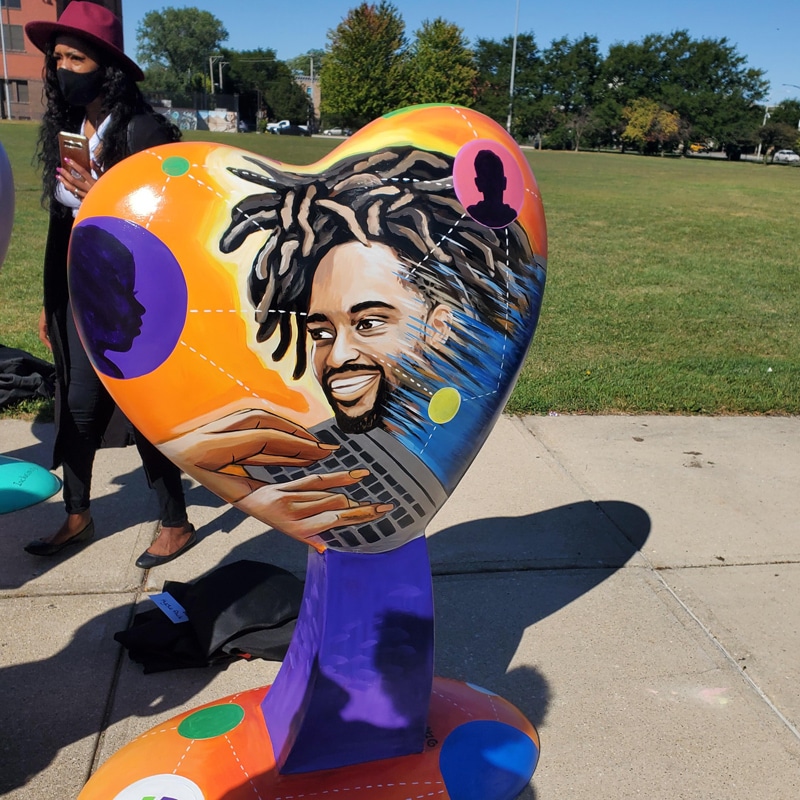
The hearts were collaboratively designed by peace circles in ten neighborhoods: Chatham, Douglas, Grand Boulevard, Greater Grand Crossing, Hyde Park, Kenwood, Oakland, South Shore, Washington Park, and Woodlawn. The peace circles provided an opportunity for the LUV Institute to partner with three other Chicago Peace Fellows: David Gonzalez, Michelle Day, and Jennifer Maddox.
In the peace circles, artists and community members came together and discussed how they would like to showcase their neighborhood’s “new normal” in light of the COVID-19 pandemic and recent political tensions.
Ten hearts were showcased at the launch of the Parade of Hearts; each heart will be placed in a South Side community.
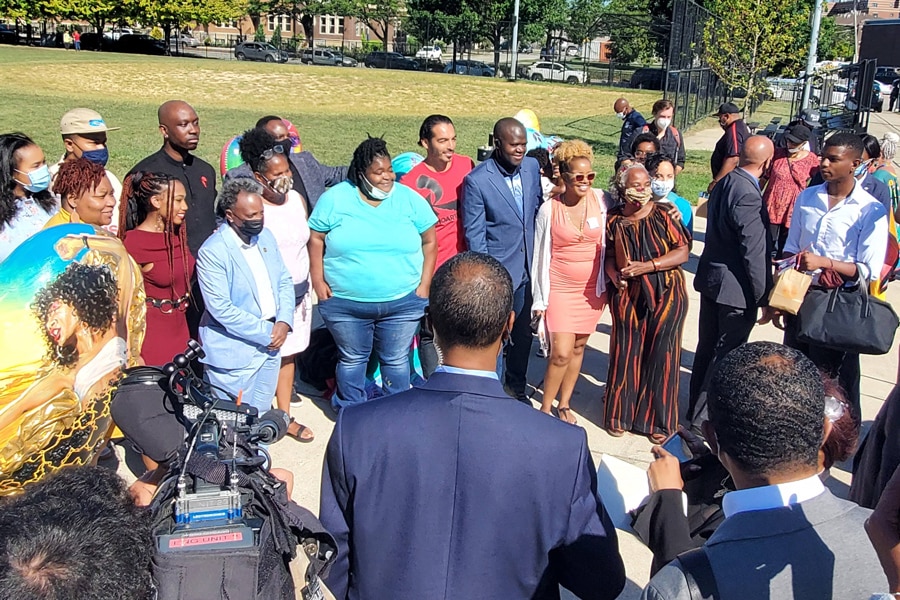
Creating a Parade of Hearts with Communal Visions
Artists acted as community representatives, expressing communal visions of neighborhoods that are beautiful and resilient. One local artist that worked on the project was Damon Lamar Reed, who created hearts for two communities, Nichols Park and Douglas. The heart that he created with the Douglas community is centered around a theme of trust with a man covering a woman’s eyes at its center and a background of stitched patchwork. The patchwork of the heart is meant to evoke memories of mothers patching ripped clothes and making them stronger than they were before. Damon and the Douglas community see this heart as symbolic of their community’s resilience and ability to memorialize the past while creating a stronger community.
Through the parade of hearts, the LUV Institute hopes to revitalize South Side communities through introducing a large-scale public arts project. Cosette emphasizes the importance of bringing arts programs to communities that are often left out of public arts initiatives. The Parade of Hearts aims to act symbolically as an expression of love trumping all, but also to bring prosperity to the featured neighborhoods. She hopes that people will come to visit the hearts and bring tourism to neighborhoods of Chicago that don’t often receive it.
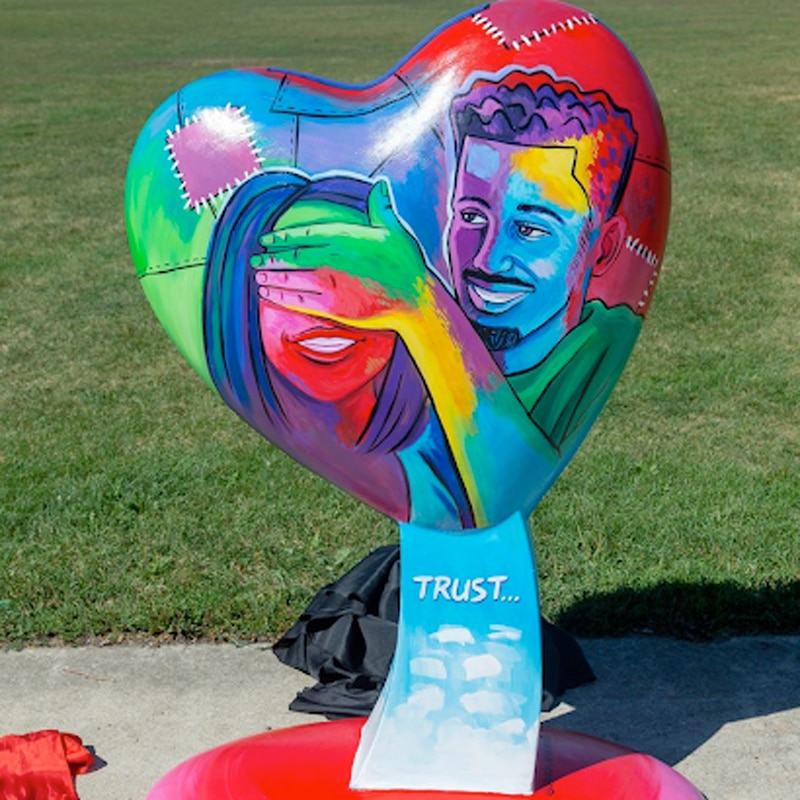
Hearts Will Show that Love Trumps Hate
The process of creating hearts was chronicled by a videographer who will release a documentary talking about the organizations involved in helping neighborhoods design their hearts as well as histories of the neighborhoods themselves. Next year, the LUV Institute will facilitate a digital treasure hunt around the Parade of Hearts, in which people can explore virtual histories of the hearts and their surrounding neighborhoods.
The hearts have started many conversations about peacebuilding in Chicago and many people and institutions have reached out to Cosette, moved by the Parade of Hearts’ message that love can trump hate. For its launch, the Parade of Hearts raised $115,000, surpassing its goal.
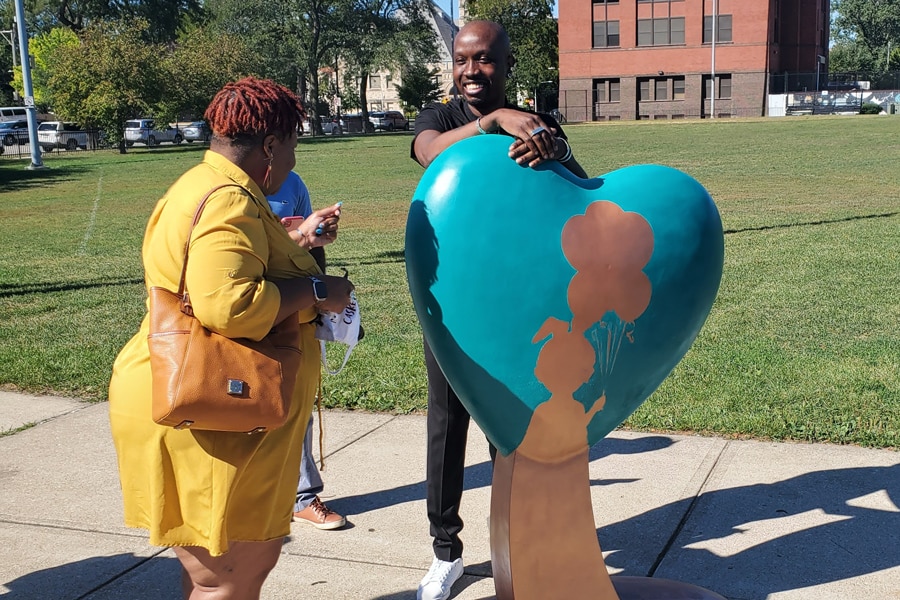
The LUV Institute intends to use this money as a seed for a larger community outreach program. Cosette envisions that soon, all 77 community areas in Chicago will be able to create hearts and that money raised through the parade can be used for restorative justice projects. In the future, she plans for the LUV Institute to partner with other local non-profits to launch similar events and initiatives that integrate the arts with community-building and trauma recovery.
Chicago’s First Annual Sukkah Design Fest Brings Together Social Justice and Design
By Zeki Salah, Facilitator, Mutual Aid Collaborative
The first annual Sukkah Design Festival was held on October 9-16, showcasing North Lawndale’s Jewish history and providing social services to the community. Reshorna Fitzpatrick, 2019 Chicago Peace Fellow and Executive Pastor of the Stone Temple Baptist Church, was a member of the organizing committee, which included community-based organizations and design firms. These groups brought the community together to explore the history of North Lawndale through collaborative design projects and built relationships centered around social justice.
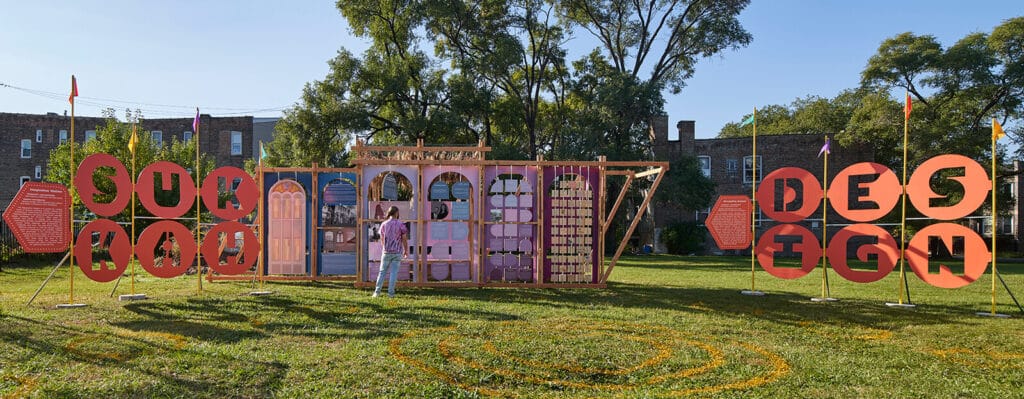
Pastor Reshorna became involved with the Sukkah Design project through her work with the Lawndale Pop-up Spot, a museum housed in a shipping container created by Chelsea Ridley, Jonathan Kelley, and members of the North Lawndale neighborhood. They built the Lawndale Pop-up Spot on a lot owned by Stone Temple Baptist Church, now called the Love Blooms Here Plaza. The Lawndale Pop-Up Spot explores the history of North Lawndale through rotating community-designed exhibits. Given the history between Pastor Reshorna and the Lawndale Pop-up Spot, she gave an enthusiastic yes when Jonathan and Kelly proposed the Sukkah Design Festival. They held the festival from October 9th to October 16th on the Love Blooms Here Plaza, across the street from Stone Temple Baptist Church. The main attraction for the event was a series of Sukkahs which aimed to promote social justice and explore cultural legacy through design.
The Sukkah Design fest created three Sukkahs, temporary outdoor structures, to celebrate the Jewish holiday, Sukkot. Sukkot celebrates the end of harvest time and involves the creation of Sukkahs where community members can gather, eat, and spend time with one another. The festival split participants into three teams. Each team included a Chicago-based design firm and a community-based organization that collaborated to design a Sukkah with a social justice element.
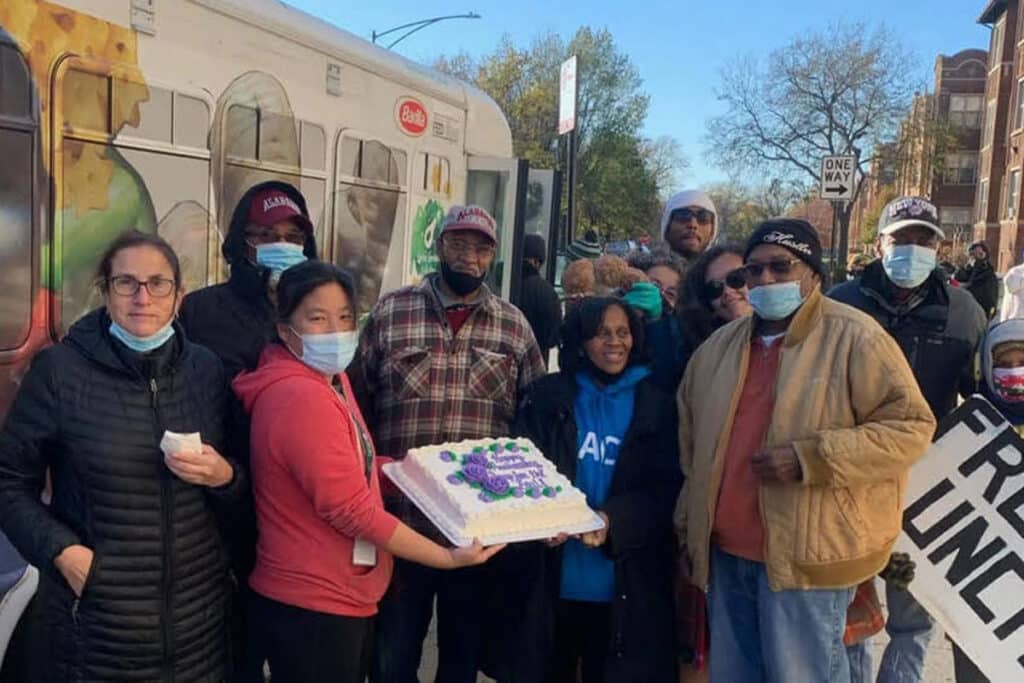
The Young Men's Educational Network (YMEN) partnered with the firm Human Scale to put together a “Giving Sukkah,” where people could receive food and flowers grown by the community. Community-grown food and flowers are a staple of the Love Blooms Here plaza, which has also housed community gardens designed by Pastor Reshorna and another 2020 Chicago Peace Fellow, Annamaria Leon. The Giving Sukkah has now moved to YMEN’s headquarters on Pulaski Boulevard.
Stone Temple Baptist Church worked with the firm New Office to design a micro-museum that explores the history of Stone Temple from 1926 to the present day. The exhibit examines the various stages the building went through as both a synagogue and a church. Current community members were also involved in its design as the team explored what residents love about North Lawndale. Through interviews and community input, the team brought the present neighborhood into conversation with its history.
Men Making a Difference and Open Books – North Lawndale Reads partnered with the Chicago Design Office and Made In Englewood. Together they created an inter-generational “book nook,” which acted as a free library. This Sukkah also served as a space where people of all ages could come together to read or play games. Collectively, all three Sukkahs tackled the issue of food accessibility, explored community assets, and built relationships between people in North Lawndale. Each Sukkah functioned as a hub for discussions, music, and food before they relocated to more permanent sites.
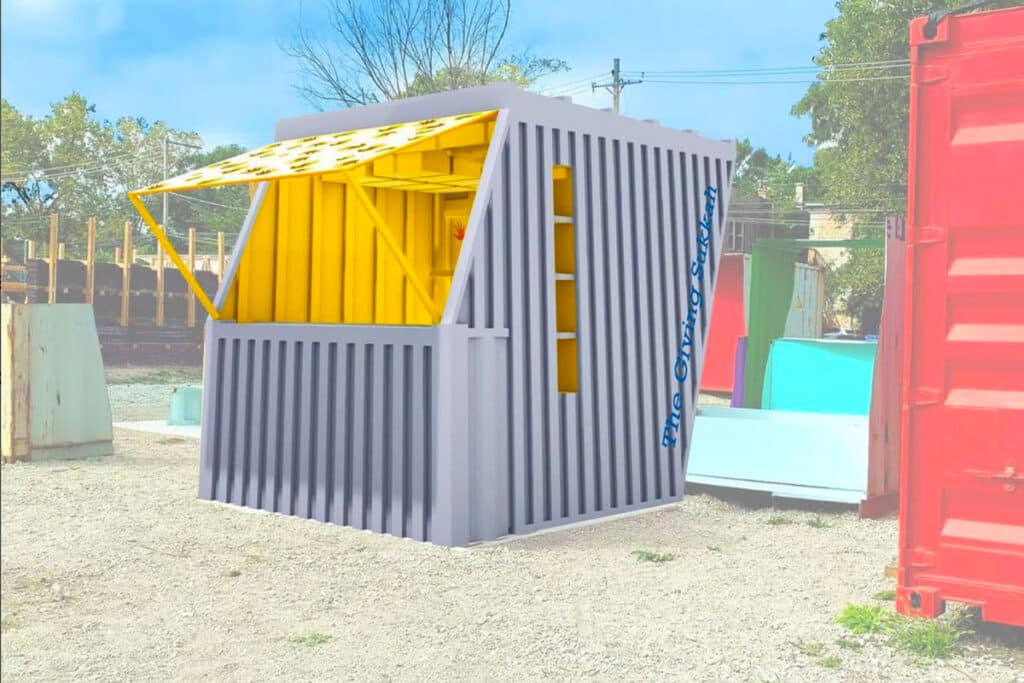
Programming at the Sukkah Design Festival brought members of the North Lawndale community together through meals and conversations about their neighborhood. Food was often a central element of the celebration: Stone Temple held their weekly “Soup for the Soul” food drive within the festival grounds, and various faith-based organizations partnered to organize interfaith dinners throughout the week. Pastor Reshorna noted that “nothing brings people together more than food,” a sentiment that inspired a community clean-up event in which participants celebrated their work picking up trash with a free meal and conversation about environmental justice.
As people gathered around food, festival organizers worked to draw their attention toward the built environment surrounding them. Community organizations gave tours of various Peace Parks in North Lawndale which aim to reactivate vacant lots. The architects and designers of the Sukkahs also held guided tours during Open House Chicago, a city-wide architectural festival. The Sukkah Design Fest inspired conversations about how the built environment can impact issues such as segregation and resource shortages. By gathering the community around food and leading discussions about their neighborhood, the Festival aimed to build new partnerships between designers, faith leaders, and community activists to address these problems.
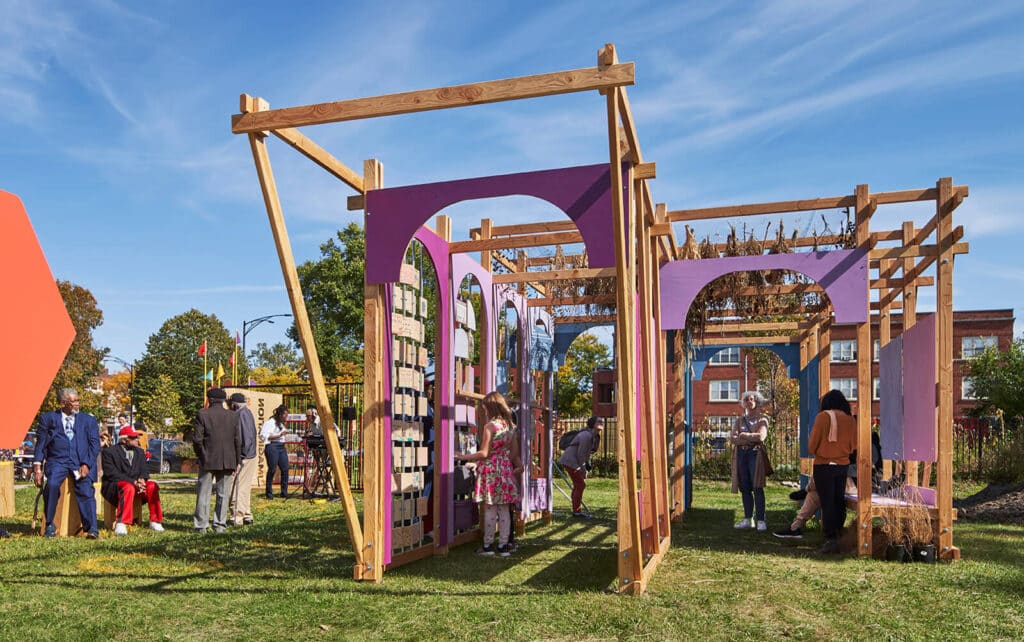
The Sukkah Design Fest built relationships amongst residents in North Lawndale and connected them to different organizations around the city as they planned music, food, and cultural programming. Architects, community members, and community organizations all came together to unite diverse groups of people that would have otherwise not likely come into contact with one another. Sukkot is a holiday associated with food, gathering, and the harvest. The festival used these themes to encourage North Lawndale’s predominantly Black population to explore their neighborhood’s Jewish history alongside traditions of fellowship and kinship. These relationship-building events provided opportunities for residents to make a difference in their community and plan social justice projects from the ground up.
By uniting a diverse range of actors and facilitating collaboration, the Sukkah Design Festival provided valuable assets to an underserved community and empowered residents. The Stone Temple Baptist Church would like to make the Sukkah they designed alongside New Office a permanent mini-exhibition within the church. The exhibit would memorialize the cooperation achieved through Black and Jewish communities through the design festival and preserve a valuable historical artifact to North Lawndale. Stone Temple is currently collecting donations to help fund the installation of the mini-exhibit.
Generation Now Helps Teens Produce New Talk Show
By Zeki Salah, Facilitator, Mutual Aid Collaborative
The Chicago Peace Fellows Mutual Aid Collaborative is introducing teenagers to work in the media industry through a project called Generation NOW. Generation NOW was conceived by Messiah Equiano, a 2021 Chicago Peace Fellow, and aims to provide opportunities for young people to work on a teen talk show that addresses everyday issues that teenagers face. The program pays teenagers to produce, direct, and act in the show and provides them with a safe environment to express their thoughts.
Messiah originally thought of the idea of a teen talk show in 2014 and pitched the idea to the television station WCIU. The project was initially based on a show that appeared on BET in the 90s and early 2000s called Teen Summit. Teen Summit provided a platform for teenagers to talk about the everyday issues they face and brought these issues into perspective within an open and safe environment. Messiah thought the idea of a teen talk show was valuable and conceptualized Generation NOW as a similar program that would also allow the young people to get involved in aspects of production.
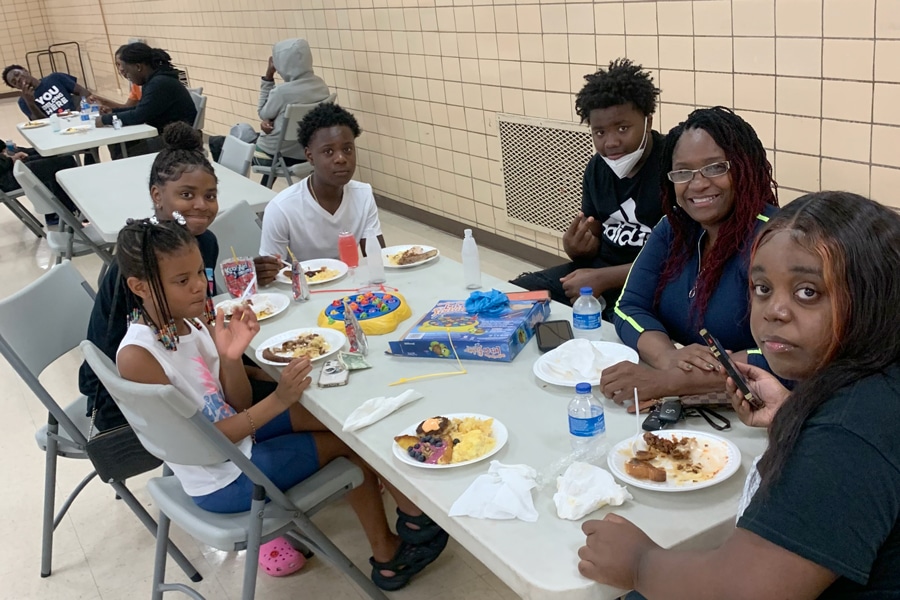
While the station turned down the pitch, Messiah persisted and applied for a grant from the Chicago Community trust to shoot a pilot episode of Generation NOW. He received the grant from the Chicago Community Trust in 2019 and filmed the pilot at Lawndale Community Academy. This experience showed him how therapeutic and empowering a platform for teens to express their issues could be. Since then, he has been working to secure funding to film more episodes of Generation NOW, including the August 5 filming that was funded by the Mutual Aid Collaborative.
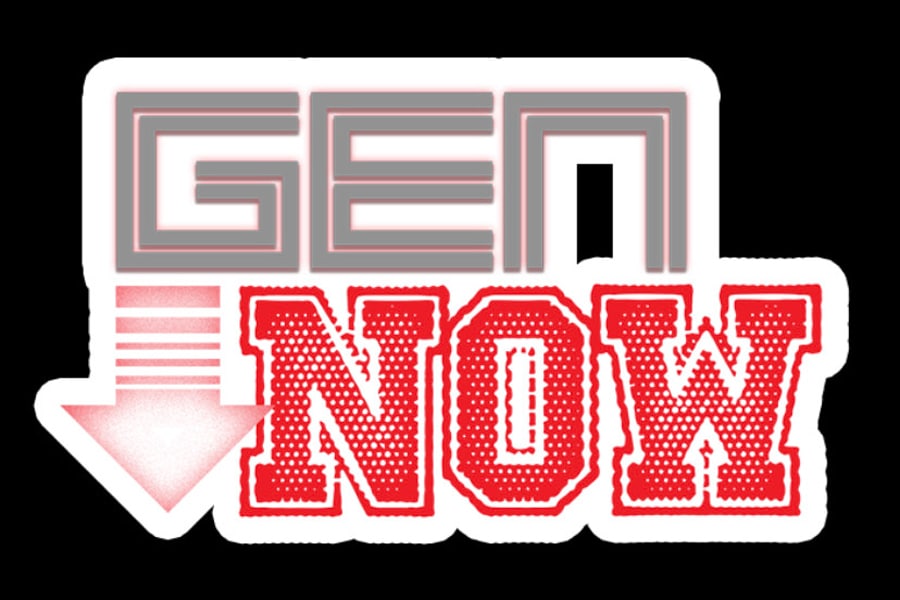
The Mutual Aid Collaborative is made up of 60 Black and Brown leaders and committed allies who live and work in the communities they serve on the South and West sides. They have raised over $86,000 to support several active projects, including Generation NOW. The Mutual Aid Collaborative met and collaboratively voted in May to provide Generation NOW with the funding to film another episode at the Foster Park District.
Generation NOW aims to provide young people with a setting to be open about their opinions, while also providing them with experience with different aspects of television production. Teens are invited to work on the project as writers, production members, or actors and are compensated for their work. On August 5th, the funds provided by the Mutual Aid Collaborative were used to pay 10 teenagers $250 each for their involvement in a day of filming. Funds were also used to provide them with meals and entertainment and also paid for a camera crew. Generation NOW aimed to provide the teens involved with a new opportunity to express themselves without judgment.
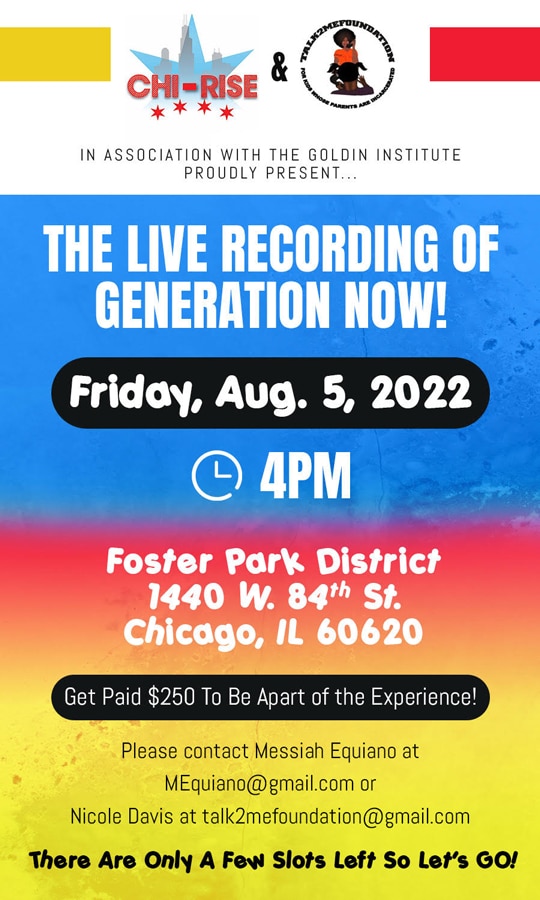
The young people were not only provided with food and time to get to know each other, but they were also told not to laugh at each other or dismiss opinions and were assured that the raw footage from the filming would not become publicly available.
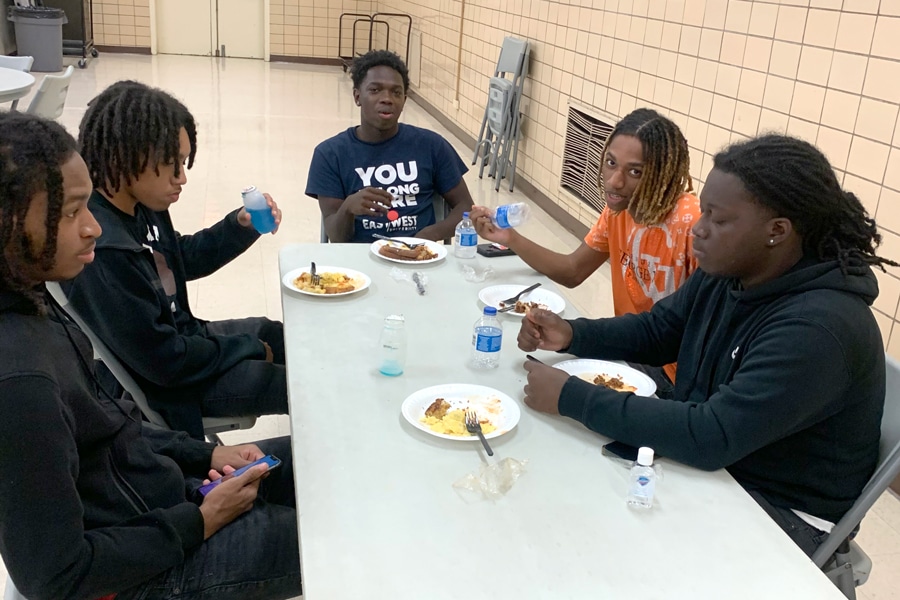
The filming of Generation NOW on August 5 was a collaborative effort between Peace Fellows. Alongside Messiah, Nicole Davis and the Talk to Me Foundation brought in actors and rehearsed together. As part of the filming, Nicole and her teens performed a skit where a woman accuses a man of stealing her purse, he denies stealing her purse, and she comes back with her brother to confront the accused man. At the end of the skit, someone approaches the woman and informs her that she left her purse in the bathroom and she apologizes. This scene was modeled after the experiences of the teens themselves, who gave input on how the scene might unfold.
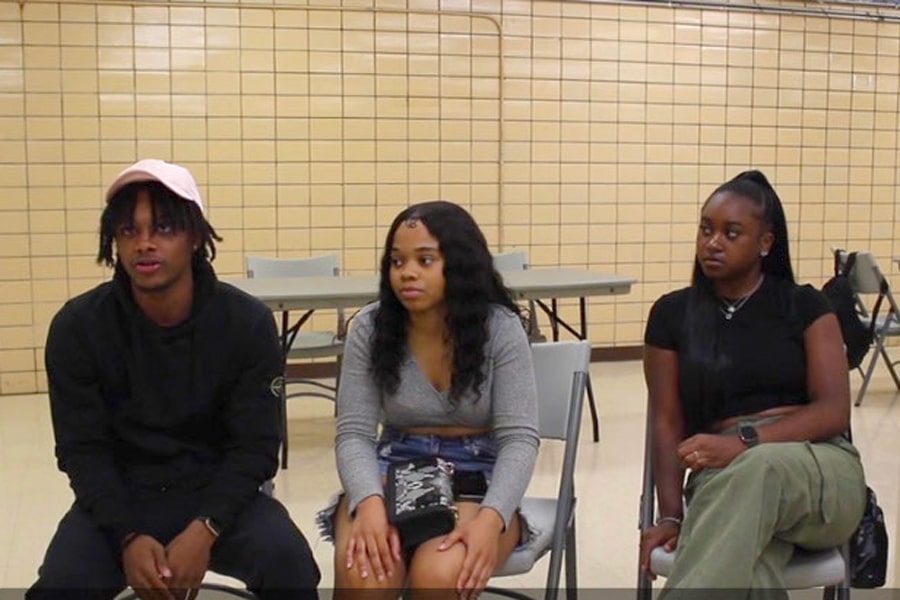
While Nicole led the rehearsal, the script of the conflict and resolution was developed by the teens. For instance, when asked what they would do if confronted about stealing, all of the young men at the filming responded that they would stand their ground during the confrontation and would not run away. The filming not only provided the teens involved with a platform to voice their beliefs without judgment, but also with a chance to enact their visions in a production and to work together collaboratively.
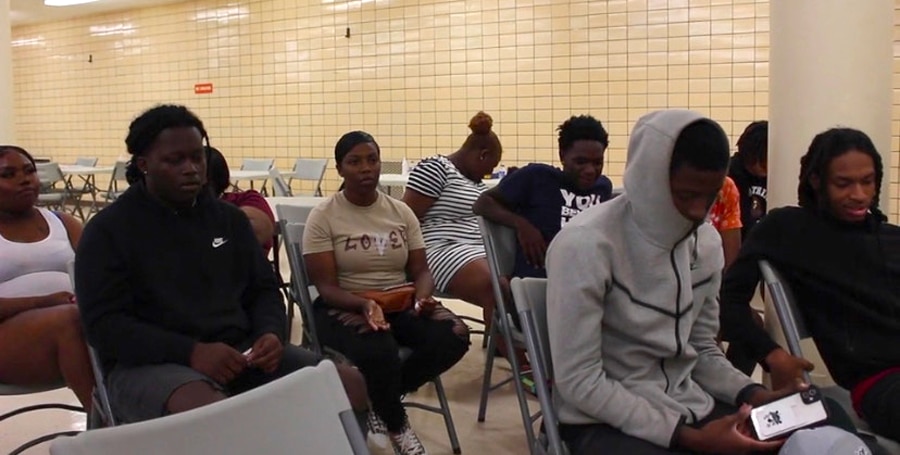
The response of the young people involved in Generation NOW has shown that the program is both therapeutic and empowering. Messiah spoke to the experience of the teens involved as they were provided with a platform to speak about topics like dating and conflict resolution: “Human beings hold onto so much in their hearts and their minds related to their experiences... Even if someone doesn’t express themself, just hearing another person make themselves available can make them feel better.” By continuing to provide this platform for teens and compensating them for their involvement, Messiah believes he can first them away from activities that might lead to violence:
[Generation NOW is about] getting a gun from someone’s hand and a camera into it. I’ve seen this in real life, I’ve seen people love it... you put a camera in his hand and he loves it. You’ve got to give them alternatives and have them get paid for it.”
Messiah’s organization, CHI-RISE, is looking for funding to continue to produce episodes of Generation NOW. They are also looking towards expanding the programs to different communities, and looking specifically at communities with higher risks of violence. Through community collaboration, they are hoping to help teenagers find work on the project during summer and winter recesses from school. Ultimately Messiah hopes to create a sustainable model for Generation NOW by getting members of the community involved and having them watch the show. Through creating content that gives back, Generation NOW aims to create safer and more connected communities.
Celebrating the Chicago Day of the Girl
by Zeki Salah, Mutual Aid Collaborative Facilitator

On October 11, the Girls Like Me Project, Inc. hosted the 11th annual Chicago Day of the Girl at the South Shore Cultural Center. The event coincides with the International Day of the Girl, which is an international observance day established by the United Nation on October 11, 2012 to increase awareness of gender inequality faced by girls worldwide and to support more opportunities for them. The Chicago Day of the Girl focuses on recognizing and providing opportunities for Black girls ages 13 to 18 years old in the City of Chicago.

This year, the theme of the Chicago Day of the Girl was “I Belong” and the programming was aimed towards reclaiming spaces for Black girls that often feel inaccessible. La’Keisha Gray-Sewell, a 2020 Chicago Peace Fellow and the Executive Director of the Girls Like Me Project spoke to the importance of reinforcing the girls’ right to spaces throughout the city: “Many girls feel like they only belong in certain spaces and that they are confined to their neighborhoods. So we wanted to build a sense of belonging: they belong to this city and that this city belongs to them.” The Chicago Day of the Girl worked to address the way the city is segregated by race, class, and income by showcasing how different organizations and resources can be utilized to celebrate and center the voices of Black girls. The South Shore Cultural Center also made for a significant venue because it gave the girls an opportunity to be in an establishment that is seen as exclusive.

Chicago Public Schools across the city participated in the Chicago Day of the Girl, with 253 girls attending in total. The University of Chicago Charter School Woodlawn, Gary Comer Charter School, and Nicholson STEM Academy were some of the schools that were connected to the Chicago Day of the Girl through partnerships with the Girls Like Me Project, Inc. The event was held from 10am - 3pm, allowing the girls to leave the classroom and receive educational enrichment outside of their schools.

As an educational enrichment opportunity outside of the classroom, the Chicago Day of the Girl was able to address issues that receive limited attention in schools, allowing programming to be gender responsive and internationally oriented. The day’s activities aimed to make the girls in attendance feel like they belong and are included in a global empowerment conversation. The Chicago Day of the Girl originally grew out of the Girls Like Me Project’s Global Connections program, which aimed to show girls in Chicago what girlhood looks like in other spaces around the world. This has influenced programming to have an international reach, that aims to not only bring the voices and perspectives of Black girls into international conversations, but also to provide resources that help them travel internationally.

Girls who attended the Chicago Day of the Girl were provided with connections to the global community and opportunities for international travel by local international organizations. WorldChicago, an internationally-oriented nonprofit focused on citizen diplomacy, presented their Youth Diplomat program to the girls in attendance. This program admits students to engage in cross-cultural conversations with international peers and attend lectures and workshops with global and Chicago area academics, government officials, and community leaders. Tiffany Smith, a travel writer from Bronzeville, also shared her experience traveling outside of the country and the barriers to travel she faced as a Black girl. The Global Strategists Association addressed some of the challenges girls might face by sharing information about passports. The Girls Like Me Project will also sponsor passports for three girls who attended the Day of the Girl, as well as African ancestry tests. Collectively the organizations involved provided tools for Black girls to engage with girlhood internationally while also showing that their voices are needed in an international space.

Organizations across the city of Chicago also collaborated to show their commitment towards supporting, celebrating, and amplifying the voices of Black girls. Damon Reed, a local Chicago artist, came and showcased murals that girls involved in the Girls Like Me Project painted with his support. The murals depict missing Black girls whose stories have not received significant media coverage. Dr. Ruby Mendenhall of UIC Champaign-Urbana also created an exhibit which was featured at the Day of the Girl by working with the mothers and daughters of the Girls Like Me Project. Their exhibit featured portraits of what brings them joy and healing. These projects showed the girls in attendance the importance of their experiences and how their stories can be told in a powerful and influential way.

The Chicago Day of the Girl provided Black girls from Chicago with a sense of belonging within both local and global communities and emphasized their capacity to enact change. The girls who attended were given tools for advocacy by the participating organization and a platform for self-expression. Local talent was also showcased, with dance performances from the Girls Like Me Project, music, a teen talk show, and a performance from Dee Dee Davis of the Bernie Mac Show. Reflecting on the day’s events La’Keisha Gray-Sewell said, “this day was all about Chicago girls and uplifting them and providing them with a platform to celebrate themselves.”
Mutual Aid Collaborative Discusses How Violence Spreads with Dr. Andrew Papachristos
By Zeki Salah, Facilitator, Mutual Aid Collaborative
On Tuesday, August 23rd, the Chicago Peace Fellows Mutual Aid Collaborative met with Dr. Andrew Papachristos, Director of the Northwestern Neighborhood & Network Initiative. The meeting was part of the Mutual Aid Collaborative Civic Partners Series, which aims to create connections between individuals and organizations that work to build peace and prevent violence.
Dr. Papachristos studies social networks and how they can help activists understand and predict who is at the highest risk of becoming a victim of gun violence. He met with members of the Chicago Peace Fellows Mutual Aid Collaborative, a network of 60 Black and Brown leaders and activists who live and work in the communities they serve on the South and West sides. Fellows came in person and online to strategize with Dr. Papachristos about how they could act to prevent the spread of violence.
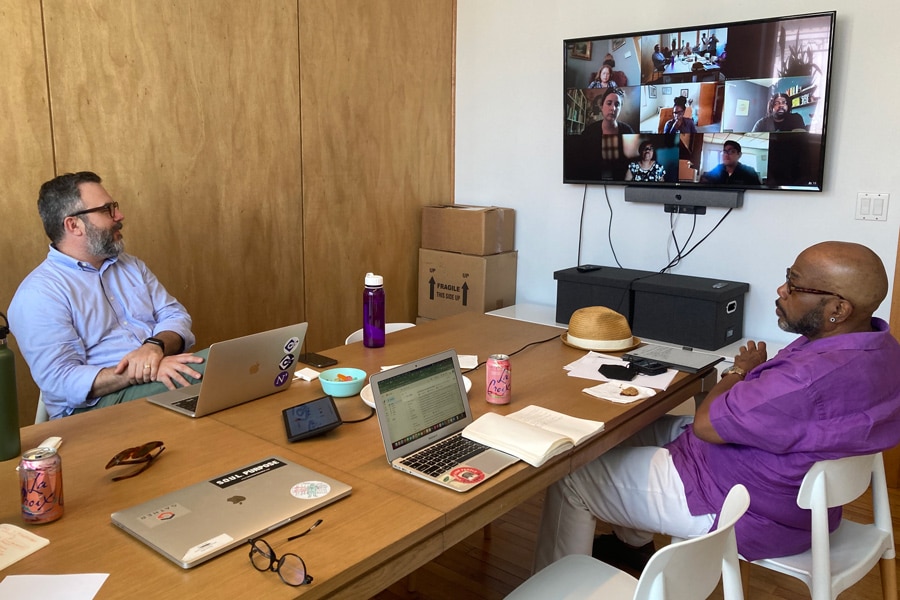
Dr. Papachristos’s research around gun violence gave Fellows insight into how the spread of gun violence can be predicted and preemptively addressed. As he presented his research, he made it clear that gun violence primarily spreads through a concentrated segment of the population. This finding suggests that most victims of gun violence either know each other or are linked together by only a few degrees of separation.
To illustrate how gun violence concentrates within particular communities, one section of Dr. Papachristos's presentation focused on how most gun violence injuries within cities affect a small proportion of the overall population. Data collected in Chicago between 2012-2016 showed that more than 70% of all subjects of gun violence are within social networks containing less than 5% of the city population, with 89% of those shootings occurring within a singular network. This insight is particularly pertinent to community activists and local organizations because it allows them to concentrate their efforts in violence prevention on the most vulnerable community members.
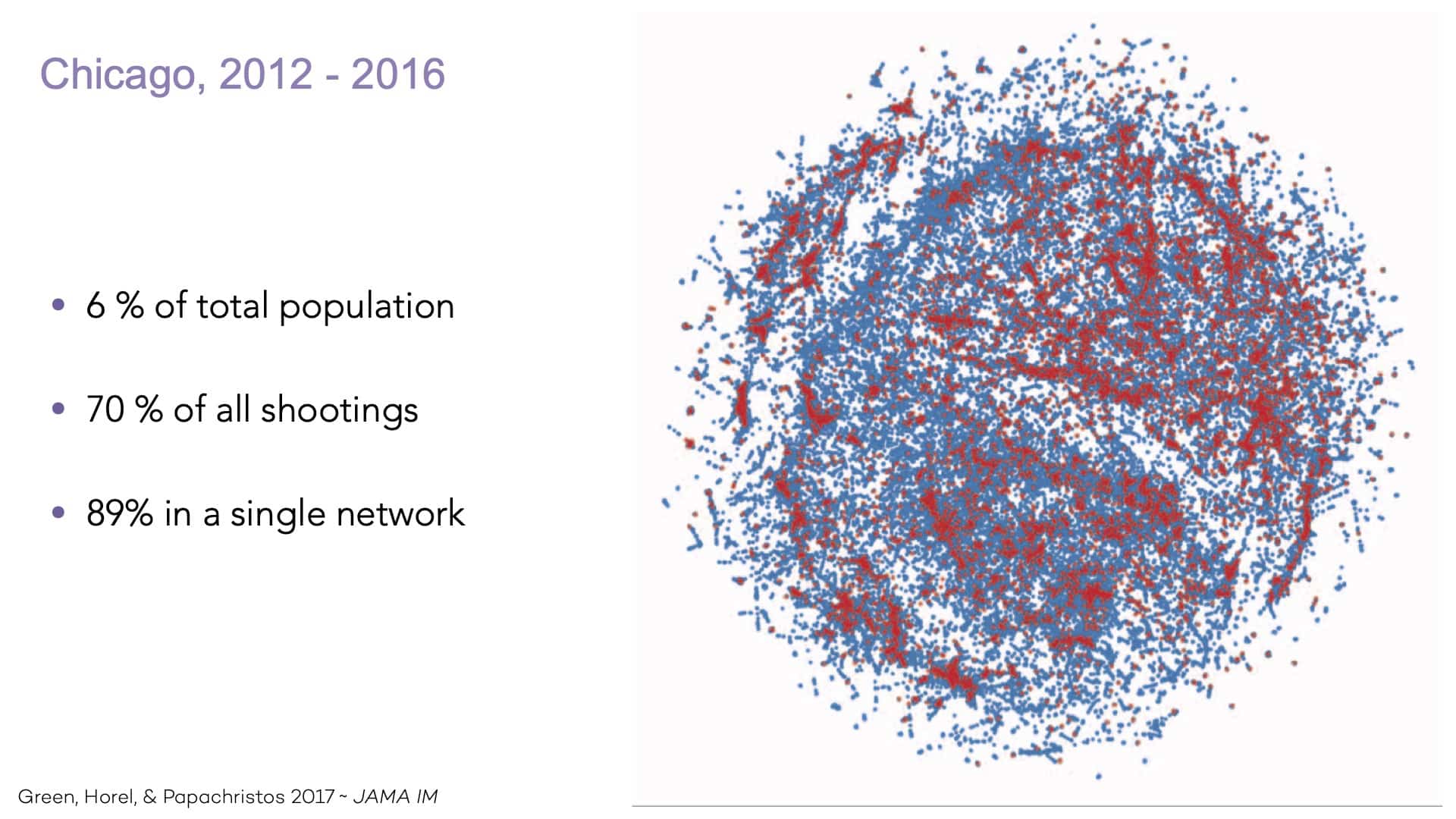
The social networks that Dr. Papachristos studies show that people affected by gun violence often share close social ties that have lasting consequences. When members of these networks face exposure to gun violence, it affects measurable aspects of their health, such as stress, sleep, and heart health. Additionally, people within these networks have a higher chance of becoming shot. While the probability of sustaining a gun injury is considerably higher for Black and Hispanic men in Chicago, the likelihood of becoming a victim rises exponentially when those men are in a social network where violence has previously occurred. Dr. Papachristos noted that a Black or Hispanic man between the ages of 14-24 within one of these networks has a higher chance of being shot than someone playing a game of Russian Roulette, in which the odds would be one in six. These figures helped frame the importance of understanding how social networks operate to the Fellows and how Fellows could utilize this information to reach members of the population facing the highest risk of becoming victims of violence.
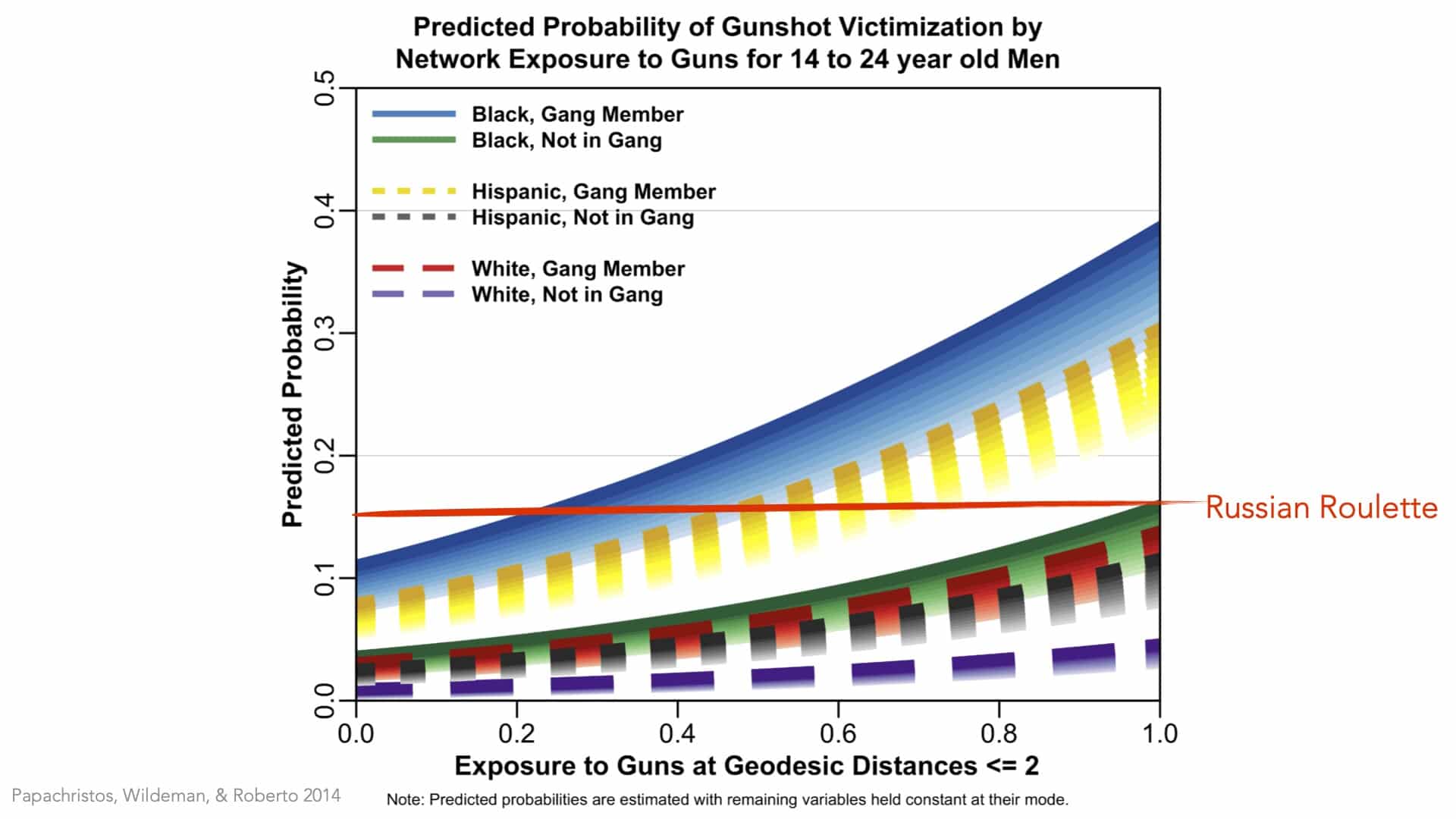
Dr. Papachristos’s research also illustrated that violence is contagious and that interrupting a potential shooting could have a cascading effect, preventing further instances of violence. He showed how he uses network science to track shootings that chain together within a social network. In Chicago, around 63% of shootings studied occurred within these chains of violence, with an average of 83-120 days between each instance. Each of the moments between these instances represents an opportunity for intervention, when victim services, trauma response teams, or outreach workers could coordinate efforts to stop the further spread of violence. When the number of responders is limited, this information is especially valuable because it helps them make the best use of their time.
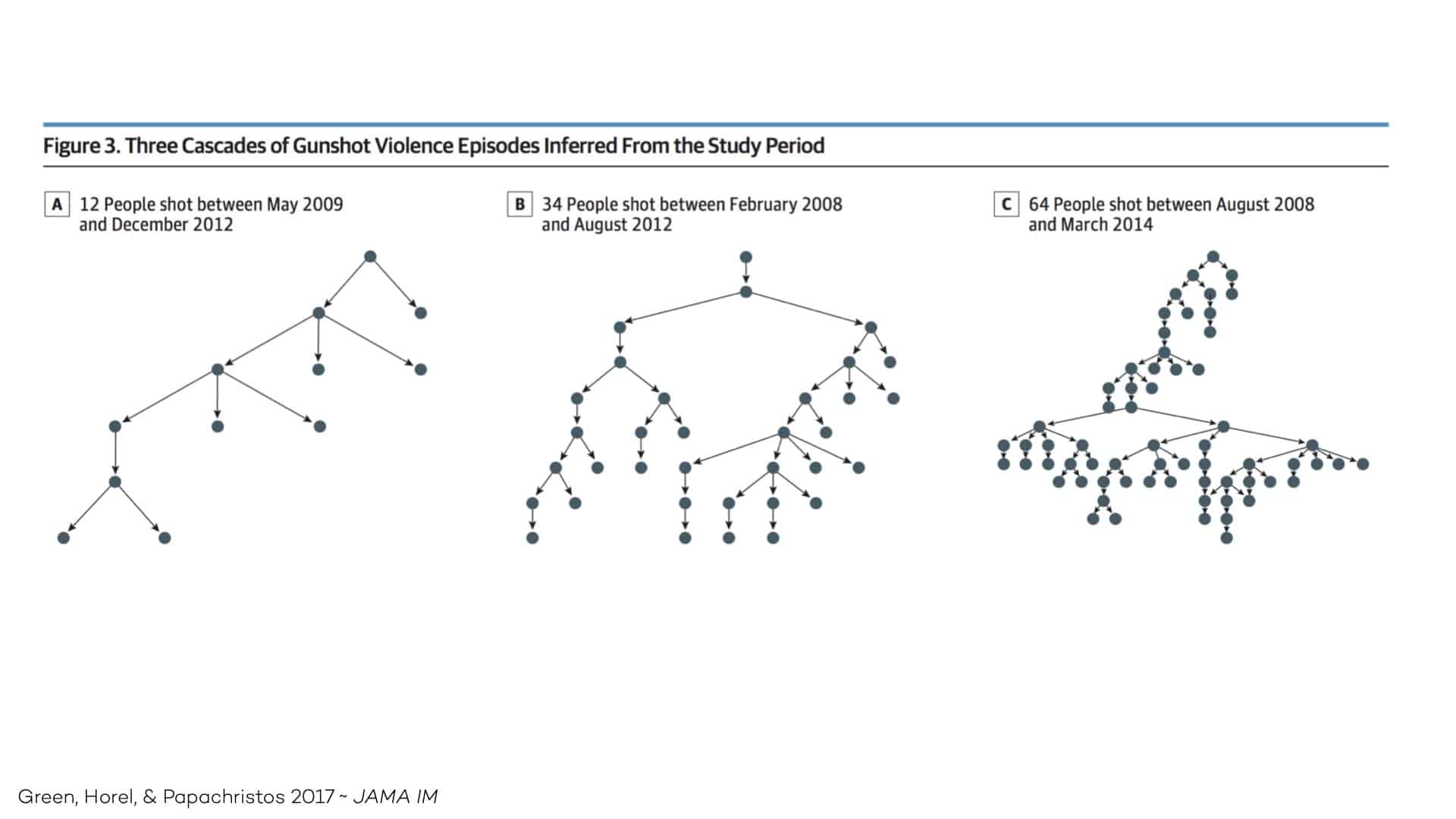
As the Mutual Aid Collaborative network entered into discussion with Dr. Papachristos, many Fellows were interested in the root causes that might catalyze a cascade of community violence. Their conversation centered around the effectiveness of poverty abatement, after-school programs, and job programs in preventing future violence. Dr. Papachristos spoke to the need for community activists to take the time to understand root causes while simultaneously engaging in an immediate response to gun violence. He asked Fellows to consider that the average age of a victim of gun violence in Chicago is 27 years old. Examining a root issue such as schooling and primary education would not be doing much for the 27-year-old linked to a network in which gun violence has previously occurred. Systemic problems, such as poverty and education, demand attention, but solutions take time to implement and typically work to benefit future generations. Immediate answers to violence, such as street outreach work, are also needed for prevention.
The conversation between Dr. Papachristos and the Mutual Aid Collaborative network also touched on the importance of narrative when framing incidents of gun violence. Peace Fellows told powerful anecdotes about their work around gun violence and its impact on individual people. For instance, Lisa Daniels, a 2019 Chicago Peace Fellow, spoke about the importance of rewriting the narrative about "offenders" of gun violence. Addressing these narratives allows the "offenders" to understand themselves as victims before their offense rather than viewing themselves as intrinsically violent people. What she claimed is critical in conversations about trauma and healing is that we "remind the individual that they are not the worst thing they have ever done" and consider the “stories victims tell themselves about who they are and what they have experienced." Dr. Papachristos expressed that he tries to capture a similar sentiment in his presentations, referring only to "victims" of gun violence:
Nothing else should matter when you’re trying to save a life.
The meeting between Dr. Papachristos and the Mutual Aid Collaborative network linked rigorous empirical research into the structure of gun violence with the lived experiences of those who work in violence prevention. As community leaders reflected on the data Dr. Papachristos shared and its implications, they also envisioned its potential uses in their own violence prevention projects. A recurring theme throughout the presentation was that there is not a unilateral solution to the epidemic of gun violence, but that different people find different solutions which lift them and members of their communities outside of the cycle of violence. This insight stresses the importance of collaborative action amongst community activists, which the Mutual Aid Collaborative aims to facilitate. It is critical for grassroots partnerships to be created to provide individuals caught within networks of violence with a range of resources that can suit their diversity of needs.
Building a Community of Practice for First Call Pastors
2019 Chicago Peace Fellow, Pastor Robert Biekman, is piloting a Community of Practice with communities of faith. Pastor Biekman, or Pastor B., is utilizing the GATHER platform to foster peer-to-peer learning amongst newly ordained pastors and church planters. The majority of these pastors have been serving their congregations for less than three years and are gaining practical experience and building relationships through this cohort. This cohort represents an investment in the future of the church.
The GATHER mobile platform effectively facilitates shared learning and a curriculum for faith community leaders with a desire to build on the talents of their neighbors and the assets of their community.
Fifteen (15) pastors are using the GATHER platform to look beyond the walls of their congregations’ and engage their communities. GATHER’s mobile classroom and toolkit for building individual and community leadership capacity has allowed these active pastors to integrate the learning journey into their schedules.
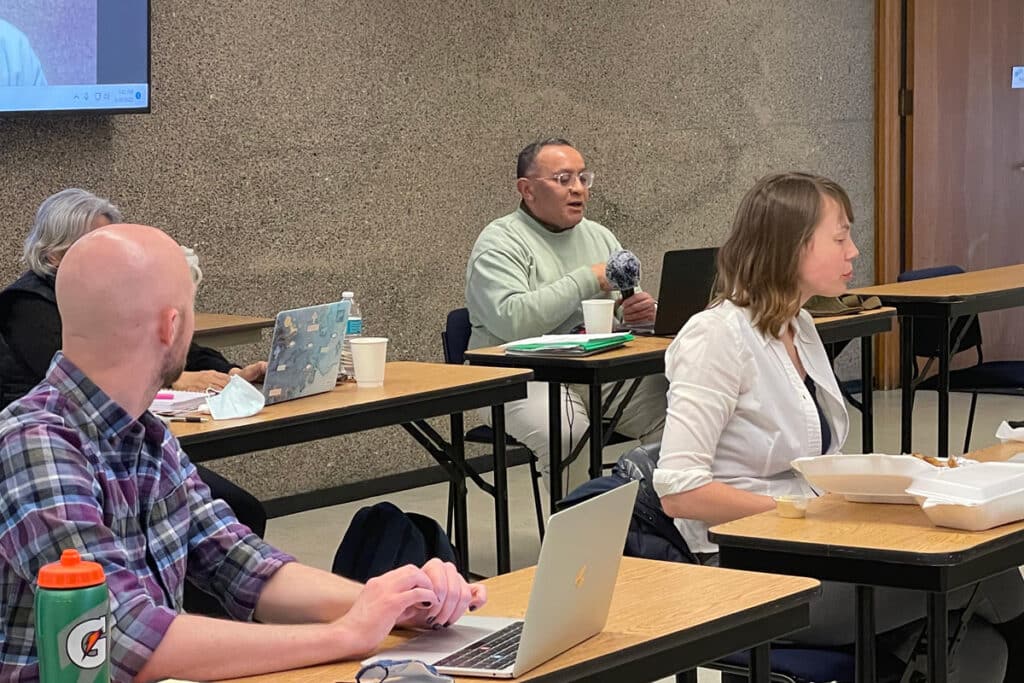
The inaugural cohort of pastors began meeting in March of 2022 and will complete their 9-month program in December. Reverend Colin Cranmer who serves as pastor at St. Mark Evangelical Lutheran Church in Elgin, Illinois shared,
"I have been engaged in this community of practice cohort for the last year and have truly enjoyed engaging with colleagues, asking critical questions about the community in which our church sits, and thinking from a 10,000-foot perspective of how God has specifically designed our church to engage...it's so comforting to know I'm not the only one struggling to understand the context of my church's culture and the community around me...Through this leadership community, I have received support and ideas to keep me going at each stage of the game. I highly recommend it!”
Reverend Colin Cranmer
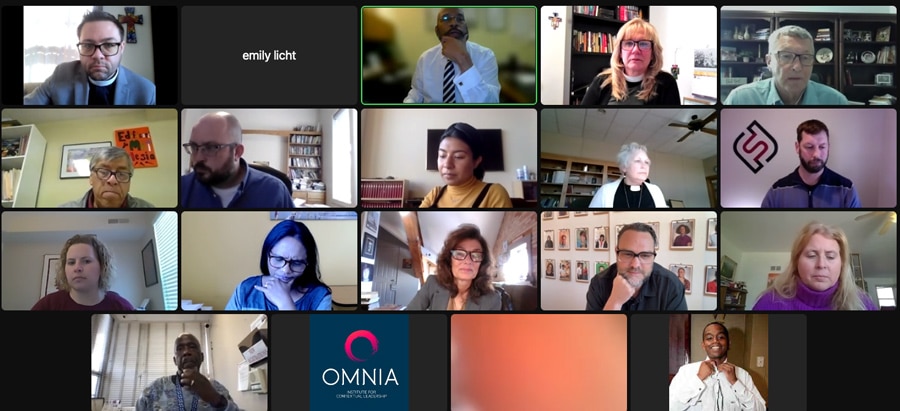
When Pastor Biekman was in the Peace Fellows program, he found value in the GATHER curriculum’s emphasis on collaboration and experience-based learning that he hopes to share with not only Lutheran but with faith leaders of other traditions. Creating a Community of Practice can potentially equip these pastors with practical knowledge of ministry and connect them with practitioner-experts.
As the first call pastors progress through the GATHER curriculum, they have two touchpoints with their Community of Practice each month: a roundtable, and a deeper dive into a subject such as asset mapping with an experienced practitioner. Through these regular meetings, the pastors discuss what work they will engage their communities in with one another.

During “touchpoint” meetings, pastors have shared successes and challenges as they work to connect with people outside their church walls. As pastors shared their experiences, they spoke to the successes of meeting their communities where they are, rather than just engaging them within the church itself.
The Reverend Maria Rojas Banda, who serves a predominantly LGBTQ+ Latinx congregation in Berwyn, Illinois spoke to the success of creating a walking group called caminando juntos—Spanish for “walking together.” Reflecting on the cohort, she said,
"The Workshops with different community leaders have been an excellent opportunity to see how other processes work in different contexts. The opportunity to read about my peers and connect with them is a great way to build up knowledge and relationships."
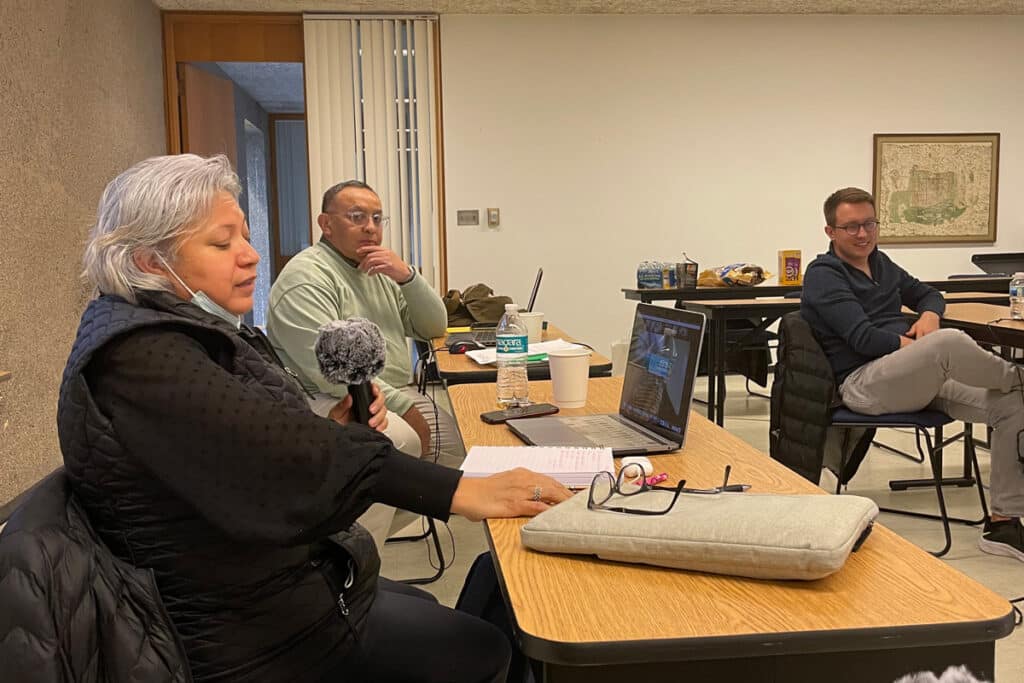
The GATHER program is customizable and can be accessed remotely as a self-paced curriculum. Pastor Biekman modified GATHER by crafting the opening reflection to approach each step of the “learning journey” through a theological lens. This has provided a common frame of reference for the pastors engaging with the material.
Additionally, the self-paced learning of the GATHER platform delivered in a hybrid format is accommodating for people’s various needs considering the COVID-19 pandemic. Combining custom material for first call pastors with a self-paced learning environment has created an inclusive Community of Practice that accommodates differences in capacity, while also uniting individuals around a common platform.
Pastor Pam Voves serves the people of Evanston, Illinois as pastor of St. Paul’s Lutheran Church, thinking about her participation with the cohort she says,
“I am grateful for the Community of Practice learning experience...the balance of expertise by veteran practitioners in the field of ministry and the cohort support from other pastors in my geographic area were most helpful...GATHER provided an easy-to-use platform...(and) also helped me connect with my pastoral colleagues outside the online sessions. The new ideas and relationships will stay with me as I continue pastoral ministry.”
Pastor Pam Voves
What has been essential to this Community of Practice is cooperation and partnership with the various expressions of the Evangelical Lutheran Church in America. Creating an accessible environment for grassroots leaders to partner with one another facilitates new partnerships and a broader community to be reached.

